ਰਬਿੰਦਰਨਾਥ ਟੈਗੋਰ ‘ਤੇ ਪੰਜਾਬੀ ਵਿੱਚ ਲੇਖ । Essay on Rabindranath Tagore in punjabi


ਰਬਿੰਦਰਨਾਥ ਟੈਗੋਰ ‘ਤੇ ਪੰਜਾਬੀ ਵਿੱਚ ਲੇਖ।Essay on Rabindranath Tagore in punjabi
ਅਸੀਂ ਆਪਣੀ ਵੈੱਬਸਾਈਟ ‘ਤੇ ਕਲਾਸ 1, 2, 3, 4, 5, 6, 7, 8, 9, 10, 11, 12 ਅਤੇ ਕਾਲਜ ਦੇ ਵਿਦਿਆਰਥੀਆਂ (Punjabi Essay for Students) ਲਈ ਵੱਖ-ਵੱਖ ਤਰ੍ਹਾਂ ਦੇ ਪੰਜਾਬੀ ਦੇ ਲੇਖ Punjabi Language Essay Post ਕਰ ਰਹੇ ਹਾਂ। ਇਸ ਕਿਸਮ ਦਾ ਲੇਖ ਤੁਹਾਡੇ ਬੱਚਿਆਂ ਅਤੇ ਵਿਦਿਆਰਥੀਆਂ ਦੀਆਂ ਵਾਧੂ ਪਾਠਕ੍ਰਮ ਗਤੀਵਿਧੀਆਂ ਜਿਵੇਂ: ਲੇਖ ਲਿਖਣ, ਬਹਿਸ ਮੁਕਾਬਲੇ ਅਤੇ ਚਰਚਾ ਵਿੱਚ ਬਹੁਤ ਮਦਦਗਾਰ ਸਾਬਤ ਹੋਵੇਗਾ।
ਆਓ ਪੜੀਏ Essay on Rabindranath Tagore in Punjabi for Student | Punjabi Essay on “Rabindranath Tagore”, “ ਰਬਿੰਦਰਨਾਥ ਟੈਗੋਰ ਪੰਜਾਬੀ ਲੇਖ ”, Punjabi Essay for Class 5, 6, 7, 8, 9 and 10
- ਭੂਮਿਕਾ – ਆਪਣੀ ਮਾਂ-ਬੋਲੀ ਬੰਗਾਲੀ ਨਾਲ ਪਿਆਰ ਕਰਨ ਕਰਕੇ ਗੀਤਕਾਰ, ਨਾਟਕਕਾਰ, ਚਿੱਤਰਕਾਰ, ਕਵੀ, ਕਲਾਕਾਰ ਰਵਿੰਦਰ ਨਾਥ ਟੈਗੋਰ ਨੂੰ ਕੌਣ ਨਹੀਂ ਜਾਣਦਾ। ਜਦੋਂ ਰਾਸ਼ਟਰੀ ਗਾਣ ਜੋ ਹਰ ਰੋਜ਼ ਸਕੂਲਾਂ ਵਿਚ ਗਾਇਆ ਜਾਂਦਾ ਹੈ, ਹਰ ਕੌਮੀ ਤਿਉਹਾਰ ਤੇ ਜਿਸ ਨੂੰ ਅਹਿਮੀਅਤ ਦਿੱਤੀ ਜਾਂਦੀ ਹੈ, ਦੇ ਰਚਨਹਾਰੇ ਦਾ ਨਾਂ ਆਉਂਦਾ ਹੈ ਤਾਂ ਉਸ ਸਮੇਂ ਵੀ ਰਵਿੰਦਰ ਨਾਥ ਟੈਗੋਰ ਨੂੰ ਯਾਦ ਕੀਤਾ ਜਾਂਦਾ ਹੈ। ਭਾਰਤ ਮਾਤਾ ਦੇ ਅਜਿਹੇ ਹੀਰੋ ਪੁੱਤਰ ਜਿਨ੍ਹਾਂ ਭਾਰਤ ਮਾਤਾ ਦੀ ਆਨ ਅਤੇ ਸ਼ਾਨ ਦੀ ਖ਼ਾਤਰ ਆਪਣਾ ਸਾਰਾ ਜੀਵਨ ਲਗਾ ਦਿੱਤਾ, ਉਨ੍ਹਾਂ ਨੂੰ ਵਾਰ-ਵਾਰ ਨਮਸਕਾਰ ਕਰਨ ਨੂੰ ਜੀ ਕਰਦਾ ਹੈ।
- ਜਨਮ ਅਤੇ ਬਚਪਨ – ਰਵਿੰਦਰਨਾਥ ਟੈਗੋਰ ਦਾ ਜਨਮ 7 ਮਈ, 1881 ਈ. ਨੂੰ ਬੰਗਾਲ ਦੇ ਮਹਾਂਨਸਰ ਕੋਲਕਾਤਾ ਵਿਖੇ ਇਕ ਬਹੁਤ ਹੀ ਅਮੀਰ ਘਰਾਣੇ ਵਿਚ ਹੋਇਆ। ਆਪ ਦੇ ਪਿਤਾ ਦਾ ਨਾਂ ਸ੍ਰੀ ਦੇਵਿੰਦਰ ਨਾਥ ਠਾਕੁਰ ਸੀ ਜੋ ਬੰਗਾਲ ਦੇ ਪ੍ਰਸਿੱਧ ਬੈਨਰਜੀ ਘਰਾਣੇ ਵਿੱਚੋਂ ਸਨ।ਆਪ ਦੇ ਪਿਤਾ ਭਾਵੇਂ ਇੱਕ ਬ੍ਰਾਹਮਣ ਪਰਿਵਾਰ ਨਾਲ ਸੰਬੰਧ ਰੱਖਦੇ ਸਨ, ਫਿਰ ਵੀ ਉਹ ਜ਼ਾਤ-ਪਾਤ, ਛੂਤ-ਛਾਤ ਜਿਹੇ ਭਰਮਾਂ ਤੋਂ ਦੂਰ ਹੀ ਰਹਿੰਦੇ ਸਨ। ਉਨ੍ਹਾਂ ਦੇ ਘਰ ਵਿਚ ਹਮੇਸ਼ਾ ਪ੍ਰਾਰਥਨਾ ਅਤੇ ਭਜਨ-ਬੰਦਗੀ ਦਾ ਮਹੌਲ ਬਣਿਆ ਹੀ ਰਹਿੰਦਾ ਸੀ। ਇਨ੍ਹਾਂ ਸਭ ਗੱਲਾਂ ਦਾ ਰਵਿੰਦਰ ਨਾਥ ’ਤੇ ਬਹੁਤ ਅਸਰ ਪਿਆ। ਘਰ ਦੇ ਧਾਰਮਿਕ ਮਹੌਲ ਦਾ ਹੀ ਅਸਰ ਸੀ ਕਿ ਆਪ ਆਪਣੇ ਪਿਤਾ ਜੀ ਨਾਲ ਹਰਿਮੰਦਰ ਸਾਹਿਬ ਦੇ ਦਰਸ਼ਨ ਕਰਨ ਲਈ ਅੰਮ੍ਰਿਤਸਰ ਆਏ, ਜਿਸ ਨੂੰ ਦੇਖ ਕੇ ਆਪ ਬਹੁਤ ਖੁਸ਼ ਹੋਏ ।
- ਵਿਦਿਆ ਪ੍ਰਾਪਤੀ – ਟੈਗੋਰ ਬਚਪਨ ਤੋਂ ਖੁੱਲ੍ਹੇ-ਡੁੱਲ੍ਹੇ ਸੁਭਾਅ ਦਾ ਸੀ। ਇਸ ਕਰਕੇ ਉਸ ਨੇ ਕਿਸੇ ਵੀ ਸਕੂਲ ਵਿੱਚ ਜਾ ਕੇ ਵਿਦਿਆ ਹਾਸਲ ਨਹੀਂ ਕੀਤੀ। ਇਸੇ ਕਰਕੇ ਪਿਤਾ ਨੇ ਆਪ ਜੀ ਦੀ ਵਿਦਿਆ ਪ੍ਰਾਪਤੀ ਲਈ ਘਰ ਵਿਚ ਹੀ ਬਹੁਤ – ਤਜ਼ਰਬੇਕਾਰ ਅਤੇ ਹੋਣਹਾਰ ਅਧਿਆਪਕ ਦੀ ਡਿਊਟੀ ਲਗਾ ਦਿੱਤੀ। ਭਾਵੇਂ ਪਿਤਾ ਦੇ ਕਹਿਣ ਅਨੁਸਾਰ ਆਪ ਨੂੰ ਉਚੇਰੀ ਵਿਦਿਆ ਦੀ ਪ੍ਰਾਪਤੀ ਲਈ ਇੰਗਲੈਂਡ ਜਾਣਾ ਪਿਆ, ਪਰੰਤੂ ਆਪ ਪੜ੍ਹਾਈ ਵਿੱਚੇ ਛੱਡ ਕੇ ਹੀ ਭਾਰਤ ਪਰਤ ਆਏ ਕਿਉਂਕਿ ਆਪ ਦੀਆਂ ਕਵਿਤਾ ਲਿਖਣ, ਚਿੱਤਰਕਾਰੀ ਕਰਨ ਜਾਂ ਕਲਾਕਾਰੀ ਦੀਆਂ ਰੁਚੀਆਂ ਨੇ ਆਪ ਨੂੰ ਉਥੇ ਰਹਿਣ ਨਹੀਂ ਦਿੱਤਾ। ਆਪ ਕੁਦਰਤ ਦੇ ਨਜ਼ਾਰਿਆਂ ਨਾਲ ਇਕ-ਮਿਕ ਹੋ ਕੇ ਰਹਿਣਾ ਪਸੰਦ ਕਰਦੇ ਸਨ।ਆਪ ਦੀਆਂ ਰੁਚੀਆਂ ਨੂੰ ਉਸ ਵੇਲੇ ਬੜਾਵਾ ਮਿਲਿਆ ਜਦੋਂ ਆਪ ਦਾ ਵਿਆਹ ਮ੍ਰਿਣਾਲਿਨੀ ਦੇਵੀ ਜਿਹੀ ਸੁੰਦਰ ਕੰਨਿਆ ਨਾਲ ਹੋ ਗਿਆ। ਉਸ ਦਿਨ ਤੋਂ ਆਪ ਦੇ ਜੀਵਨ ਵਿਚ ਪ੍ਰੇਮ ਦਾ ਹੜ੍ਹ ਜਿਹਾ ਹੀ ਆ ਗਿਆ। ਉਸ ਦੇ ਆਉਣ ਨਾਲ ਆਪ ਦੀ ਕਵਿਤਾ ਵਿਚ ਪ੍ਰੇਮ ਦਾ ਅਥਾਹ ਸਾਗਰ ਹੀ ਸਮਾ ਗਿਆ, ਜੋ ਫੁੱਟ-ਫੁੱਟ ਕੇ ਬਾਹਰ ਨਿਕਲਣ ਲੱਗਾ। ਇਹ ਉਸੇ ਦਾ ਹੀ ਨਤੀਜਾ ਸੀ ਜੋ ਆਪ ਨੇ ‘ਗੀਤਾਂਜਲੀ ਨਾਂ ਦਾ ‘ਕਾਵਿ ਸੰਗ੍ਰਹਿ` ਲਿਖਿਆ ਜਿਸ ’ਤੇ ਆਪ ਨੂੰ ਦੁਨੀਆਂ ਦਾ ਮਹਾਨ ਪੁਰਸਕਾਰ ‘ਨੋਬਲ ਪੁਰਸਕਾਰ ਮਿਲਿਆ।
- ਸਾਹਿਤ ਦੀ ਰਚਨਾ – ਆਪ ਦਾ ਸਾਹਿਤ ਵੱਲ ਬਚਪਨ ਤੋਂ ਹੀ ਆਪ ਦਾ ਕਾਫ਼ੀ ਝੁਕਾਅ ਸੀ। ਛੋਟੀ ਉਮਰ ਤੋਂ ਹੀ ਆਪ ਨੇ ਕਵਿਤਾ, ਨਾਵਲ, ਨਾਟਕ, ਇਕਾਂਗੀਆਂ, ਕਹਾਣੀਆਂ, ਨਿਬੰਧ ਆਦਿ ਲਿਖਣੇ ਸ਼ੁਰੂ ਕਰ ਦਿੱਤੇ ਸਨ। ਆਪ ਨੇ ਇਹ ਆਪਣੀਆਂ ਸਾਰੀਆਂ ਰਚਨਾਵਾਂ ਆਪਣੀ ਮਾਂ-ਬੋਲੀ ਬੰਗਾਲੀ ਵਿਚ ਹੀ ਲਿਖੀਆਂ। ਆਪ ਨੇ ‘ਸ਼ਾਮ ਦੇ ਗੀਤ’, ‘ਪ੍ਰਭਾਤ ਦੇ ਗੀਤ’, ‘ਤਸਵੀਰਾਂ ਦਾ ਰਾਗ’, ‘ਨਵਾਂ ਚੰਨ, ‘ਪ੍ਰਾਰਥਨਾ’, ‘ਭੁੱਖੇ ਪੱਥਰ’, ‘ਤਾਰਾ’, ‘ਕਾਬਲੀ ਵਾਲਾ” ਜਿਹੀਆਂ ਪ੍ਰਸਿੱਧ ਰਚਨਾਵਾਂ ਲਿਖ ਕੇ ਸਾਹਿਤ ਜਗਤ ਵਿਚ ਧੂਮ ਮਚਾ ਦਿੱਤੀ। ਆਪਣੀਆਂ ਇਨ੍ਹਾਂ ਕੁਝ ਕਹਾਣੀਆਂ, ਇਕਾਂਗੀ, ਨਾਟਕਾਂ ਆਦਿ ‘ਤੇ ਫਿਲਮਾਂ ਵੀ ਬਣ ਚੁੱਕੀਆਂ ਹਨ ਨਾਟਕ ਵੀ ਖੇਡੇ ਜਾ ਚੁੱਕੇ ਹਨ। ਇਨ੍ਹਾਂ ਵਿੱਚੋਂ “ਕਾਬਲੀ ਵਾਲਾ’ ਕਹਾਣੀ ਅਤੇ ‘ਡਾਕ-ਘਰ’ ਨਾਟਕ ਬਹੁਤ ਪ੍ਰਸਿੱਧ ਹਨ।
- ਸ਼ਾਂਤੀ ਨਿਕੇਤਨ ਦੀ ਸਥਾਪਨਾ – ਕਿਉਂਕਿ ਆਪ ਸ਼ੁਰੂ ਤੋਂ ਹੀ ਖੁੱਲ੍ਹੇ-ਡੁੱਲ੍ਹੇ ਅਤੇ ਅਜ਼ਾਦ ਖਿਆਲਾਂ ਦੇ ਮਾਲਕ ਸਨ, ਇਸ ਲਈ ਆਪ ਚਾਹੁੰਦੇ ਸਨ ਕਿ ਕਿਸੇ ਅਜਿਹੀ ਸੰਸਥਾ ਦੀ ਸਥਾਪਨਾ ਕੀਤੀ ਜਾਵੇ ਜਿਸ ਵਿਚ ਵਿਦਿਆਰਥੀ ਅਸਾਨੀ ਨਾਲ ਵਿਦਿਆ ਹਾਸਲ ਕਰ ਸਕਣ। ਉਨ੍ਹਾਂ ‘ਤੇ ਕੋਈ ਕਿਤਾਬੀ ਬੋਝ ਨਾ ਹੋਵੇ। ਉਹ ਸਕੂਲ ਵਿਚ ਬੱਝ ਕੇ ਪੜ੍ਹਾਈ ਨਾ ਕਰਨ। ਆਪਣੇ ਇਸ ਸੁਪਨਿਆਂ ਦੇ ਸਕੂਲ ਨੂੰ ਸੰਜੋਣ ਲਈ ਆਪ ਨੇ ਸ਼ਾਂਤੀ ਨਿਕੇਤਨ ਦੀ ਸਥਾਪਨਾ ਕੀਤੀ। ਇਹ ਇਕ ਅਜਿਹੀ ਸੰਸਥਾ ਸੀ, ਜਿਸ ਵਿਚ ਵਿਦਿਆਰਥੀਆਂ ਨੂੰ ਮੁਫ਼ਤ ਵਿਦਿਆ ਦਿੱਤੀ ਜਾਂਦੀ ਸੀ। ਉਨ੍ਹਾਂ ਨੇ ਸਲੇਬਸ ਵਿਚ ਕਿਤਾਬੀ ਪੜ੍ਹਾਈ ਨਾਲੋਂ ਕਲਾਤਮਕਤਾ, ਕੁਦਰਤੀ ਦ੍ਰਿਸ਼ਾਂ ਦੇ ਚਿਤਰਣ ਲਈ ਚਿੱਤਰਕਾਰੀ, ਨਾਟਕ, ਨਾਵਲ, ਕਹਾਣੀ ਲੇਖਣ ਆਦਿ ਨੂੰ ਤਰਜ਼ੀਹ ਦਿੱਤੀ ਜਾਂਦੀ ਸੀ। ਅੱਜ ਵੀ ਆਪ ਦਾ ਲਗਾਇਆ ਉਹ ਬੂਟਾ ‘ਸ਼ਾਂਤੀ ਨਿਕੇਤਨ’ ਵਿਸ਼ਵ ਵਿਦਿਆਲਾ ਦੇ ਰੂਪ ਵਿੱਚ ਫਲ-ਫੁੱਲ ਰਿਹਾ ਹੈ, ਜਿੱਥੇ ਦੇਸ਼-ਵਿਦੇਸ਼ ਤੋਂ ਵਿਦਿਆਰਥੀ ਆ ਕੇ ਸਿਖਿਆ ਹਿਣ ਕਰ ਰਹੇ ਹਨ।
- ਪ੍ਰਸਿੱਧ ਦੇਸ਼-ਭਗਤ – ਟੈਗੋਰ ਸਿਰਫ਼ ਇਕ ਸਾਹਿਤਕਾਰ ਹੀ ਨਹੀਂ ਸਨ ਬਲਕਿ ਇਕ ਸੱਚੇ ਦੇਸ਼-ਭਗਤ ਵੀ ਸਨ। ਦੇਸ਼-ਭਗਤੀ ਦਾਜਜ਼ਬਾ ਇਨ੍ਹਾਂ ਦੇ ਦਿਲ ਵਿਚ ਕੁੱਟ-ਕੁੱਟ ਕੇ ਭਰਿਆ ਪਿਆ ਸੀ। ਭਾਵੇਂ ਆਪ ਨੇ ਸਿੱਧੇ ਰੂਪ ਵਿਚ ਕਿਸੇ ਅਜ਼ਾਦੀ ਅੰਦੋਲਨ ਵਿਚ ਹਿੱਸਾ ਨਹੀਂ ਲਿਆ ਫਿਰ ਵੀ ਆਪਣੀਆਂ ਲਿਖਤਾਂ ਰਾਹੀਂ ਅੰਗਰੇਜ਼ ਸਰਕਾਰ ਦੀਆਂ ਨੀਤੀਆਂ ਨੂੰ ਭੰਡਦੇ ਰਹੇ। ਜਲ੍ਹਿਆਂਵਾਲੇ ਬਾਗ ਦੇ ਖੂਨੀ ਸਾਕੇ ਦਾ ਆਪ ਦੇ ਕੋਮਲ ਮਨ ’ਤੇ ਏਨਾ ਅਸਰ ਹੋਇਆ ਸੀ ਕਿ ਆਪ ਦੀ ਆਤਮਾ ਕੰਬ ਉੱਠੀ ਸੀ। ਉਸ ਦਾ ਹੀ ਅਸਰ ਸੀ ਕਿ ਮਹਾਤਮਾ ਗਾਂਧੀ ਵੱਲੋਂ ਚਲਾਈ ਜਾ ਰਹੀ ਨਾ-ਮਿਲਵਰਤਨ ਲਹਿਰ ’ਤੇ ਅਮਲ ਕਰਦਿਆਂ ਆਪ ਨੇ ਅੰਗਰੇਜ਼ ਸਰਕਾਰ ਵੱਲੋਂ ਆਪ ਨੂੰ ਮਿਲਿਆ ‘ਸਰ ਦਾ ਖਿਤਾਬ ਵਾਪਸ ਕਰ ਦਿੱਤਾ ਸੀ ਜਿਸ ਨੂੰ ਪ੍ਰਾਪਤ ਕਰਨਾ ਕਿਸੇ ਵੀ ਨਾਗਰਿਕ ਵਾਸਤੇ ਮਾਣ ਵਾਲੀ ਗੱਲ ਹੁੰਦੀ ਹੈ। ਇਸੇ ਕਰਕੇ ਮਹਾਤਮਾ ਗਾਂਧੀ ਜੀ ਆਪ ਨੂੰ ‘ਗੁਰੂਦੇਵ’ ਕਹਿੰਦੇ ਸਨ।
- ਦੇਹਾਂਤ – ਇਹ ਮਹਾਨ ਸਾਹਿਤਕਾਰ ਅਤੇ ਦੇਸ਼ ਭਗਤ 1941 ਈ. ਵਿਚ 80 ਸਾਲ ਦੀ ਉਮਰ ਭੋਗ ਕੇ ਦੇਸ਼ ਵਾਸੀਆਂ ਨੂੰ ਸਦਾ ਲਈ ਅਲਵਿਦਾ ਕਹਿ ਗਿਆ। ਜਦੋਂ ਤਕ ਵੀ ਰਾਸ਼ਟਰੀ ਗਾਣ ‘ਜਨ-ਗਣ-ਮਨ’ਦੇ ਬੋਲ ਸਾਡੇ ਕੰਨਾਂ ਵਿਚ ਗੂੰਜਦੇ ਰਹਿਣਗੇ, ਇਸ ਮਹਾਨਸ਼ਖ਼ਸੀਅਤ ਨੂੰ ਯਾਦ ਕੀਤਾ ਜਾਂਦਾ ਰਹੇਗਾ।
Essay on Rabindranath Tagore in Punjabi for Student
Read More Punjabi Essays
ਪੰਜਾਬੀ ਲੇਖ : ਮਹਾਤਮਾ ਗਾਂਧੀ ਬਾਰੇ ਲੇਖ | Essay on Mahatma Gandhi in Punjabi for Student
ਪੰਜਾਬੀ ਦੇ ਲੇਖ : ਪ੍ਰਦੂਸ਼ਣ ‘ ਤੇ ਲੇਖ | Essay on Pollution in Punjabi
ਚਰਿੱਤਰ ਦਾ ਨਿਰਮਾਣ ਕਰਦੀ ਹੈ ਇਮਾਨਦਾਰੀ | Essay on Honesty in Punjabi Language
Related Posts
Akbar birbal punjabi kahani – ਹਰਾ ਘੋੜਾ.

Punjabi Application : ਮਾਪਿਆਂ ਦੁਆਰਾ ਸਕੂਲ ਵਿੱਚ ਦਾਖਲੇ ਲਈ ਅਰਜ਼ੀ ਪੰਜਾਬੀ ਵਿੱਚ।

ISRO Free Certificate Online Course in Remote Sensing
Leave a comment cancel reply.
Save my name, email, and website in this browser for the next time I comment.
Punjabi Essay on “Rabindranath Tagore”, “ਰਵਿੰਦਰ ਨਾਥ ਟੈਗੋਰ”, Punjabi Essay for Class 10, Class 12 ,B.A Students and Competitive Examinations.
ਰਵਿੰਦਰ ਨਾਥ ਟੈਗੋਰ.
Rabindranath Tagore
ਲੇਖ ਨੰਬਰ:੦੧
ਜਾਣ-ਪਛਾਣ : ਭਾਰਤ ਦੀ ਧਰਤੀ ਬੜੀ ਮਹਾਨ ਅਤੇ ਪਵਿੱਤਰ ਹੈ। ਇੱਥੇ ਗਰਆਂ ਪੀਰਾਂ, ਪੈਗੰਬਰਾਂ, ਪਸਿੱਧ ਕਵੀਆਂ ਅਤੇ ਲੇਖਕਾਂ ਨੇ ਜਨਮ ਲਿਆ ਹੈ। ਗੁਰਦੇਵ ਰਵਿੰਦਰ ਨਾਥ ਟੈਗੋਰ ਵੀ ਸੰਸਾਰ ਦੇ ਇਕ ਮਹਾਨ ਕਵੀ ਹੋਏ ਹਨ। ਉਹਨਾਂ ਨੂੰ ਆਪਣੀ ਕਾਵਿ ਪੁਸਤਕ ਗੀਤਾਂਜਲੀ ਤੇ ਸੰਸਾਰ ਦਾ ਸਭ ਤੋਂ ਵੱਡਾ ਇਨਾਮ ਨੋਬਲ ਪੁਰਸਕਾਰ ਮਿਲਿਆ ਸੀ। ਅੰਗਰੇਜ਼ ਸਰਕਾਰ ਨੇ ਉਹਨਾਂ ਨੂੰ ‘ਸਰ’ ਦੀ ਪਦਵੀ ਵੀ ਦਿੱਤੀ ਸੀ। ਇਹ ਖਿਤਾਬ ਗੁਰਦੇਵ ਨੇ ਅੰਗਰੇਜ਼ ਸਰਕਾਰ ਨੂੰ ਉਸ ਵੇਲੇ ਗੁੱਸੇ ਵਜੋਂ ਮੋੜ ਦਿੱਤਾ ਸੀ ਜਦੋਂ ਉਹਨਾਂ ਨੇ ਜਲਿਆਂ ਵਾਲੇ ਕਾਂਡ ਬਾਰੇ ਸੁਣਿਆ ਸੀ।ਉਹ ਮਹਾਨ ਕਵੀ, ਉੱਚ ਪਾਏ ਦੇ ਕਹਾਣੀਕਾਰ, ਸੱਚੇ ਦੇਸ਼ ਭਗਤ, ਧਰਮ ਤੇ ਪੂਰੀ ਤਰਾਂ ਕਾਇਮ ਰਹਿਣ ਵਾਲੇ, ਆਤਮ-ਸਨਮਾਨ ਵਾਲੇ ਅਤੇ ਗੌਰਵਸ਼ਾਲੀ ਭਾਰਤੀ ਸਨ।
ਜਨਮ : ਮਹਾਂਕਵੀ ਰਵਿੰਦਰ ਨਾਥ ਟੈਗੋਰ ਦਾ ਜਨਮ 7 ਮਈ, ਸੰਨ 1861 ਨੂੰ ਕਲਕੱਤਾ ਦੇ ਇਕ ਉੱਚ ਘਰਾਣੇ ਵਿਖੇ ਹੋਇਆ। ਟੈਗੋਰ ਨੂੰ ਬਚਪਨ ਤੋਂ ਹੀ ਕੁਦਰਤ ਅਤੇ ਕੁਦਰਤੀ ਨਜ਼ਾਰਿਆਂ ਨਾਲ ਡੂੰਘਾ ਪਿਆਰ ਸੀ। ਉਹ ਅਕਸਰ ਉਹਨਾਂ ਥਾਵਾਂ ਉੱਤੇ ਵਾਰਵਾਰ ਜਾਣਾ ਚਾਹੁੰਦੇ ਸਨ ਜਿੱਥੇ ਕੁਦਰਤੀ ਨਜ਼ਾਰਿਆਂ ਦੀ ਭਰਮਾਰ ਹੋਵੇ। ਉਹਨਾਂ ਦੀ ਹਰ ਕਵਿਤਾ ਅਤੇ ਗਲਪ ਉੱਤੇ ਵੀ ਕੁਦਰਤ ਜਿਵੇਂ ਸਵਾਰ ਹੈ। ਟੈਗੋਰ ਨੂੰ ਫੁੱਲਾਂ, ਝਰਨਿਆਂ, ਵੱਸਦੇ ਬੱਦਲਾਂ, ਤਾਰਿਆਂ ਭਰੋ ਅਸਮਾਨ ਅਤੇ ਅਕਾਸ਼ ਵਿੱਚ ਉੱਡਦੇ ਪੰਛੀਆਂ ਵਾਲੇ ਨਜ਼ਾਰੇ ਬਹੁਤ ਚੰਗੇ ਲੱਗਦੇ ਸਨ।
ਮੁੱਢਲੀ ਵਿੱਦਿਆ : ਉਹਨਾਂ ਦੀ ਆਰੰਭਿਕ ਵਿੱਦਿਆ ਘਰ ਵਿੱਚ ਹੀ ਹੋਈ।ਉਹਨਾਂ ਨੂੰ ਸਕਲਾਂ ਵਿਚ ਪੜਾਉਣ ਦਾ ਢੰਗ ਬਿਲਕੁਲ ਹੀ ਪਸੰਦ ਨਹੀਂ ਸੀ। ਉਹਨਾਂ ਨੂੰ ਬੱਚਿਆਂ ਨੂੰ ਸਜ਼ਾ ਦੇਣਾ ਉੱਕਾ ਹੀ ਚੰਗਾ ਨਹੀਂ ਸੀ ਲੱਗਦਾ। ਉਹਨਾਂ ਨੇ ਆਪਣੇ ਸਾਹਿਤ ਦੁਆਰਾ ਵੀ ਇਸ ਗੱਲ ਦਾ ਪ੍ਰਚਾਰ ਕੀਤਾ ਹੈ। ਅਸਲ ਵਿਚ ਉਹ ਕੁਦਰਤ ਦੇ ਰੰਗ ਵਿਚ ਰੰਗੇ ਇਕ ਵੱਖਰੀ ਕਿਸਮ ਦੇ ਲੇਖਕ ਅਤੇ ਇਨਸਾਨ ਸਨ। ਉਹਨਾਂ ਨੇ ਜਿੰਨਾ ਵੀ ਸਾਹਿਤ ਰਚਿਆ, ਉਹ ਸਾਰਾ ਹੀ ਇਨਸਾਨੀ ਪੱਖ ਤੋਂ ਲਾਭਦਾਇਕ ਹੈ। ਉਹਨਾਂ ਨੇ ਨਾਵਲ, ਕਹਾਣੀ ਅਤੇ ਕੁਝ ਲੇਖ ਵੀ ਲਿਖੇ ਸਨ, ਪਰ ਉਹਨਾਂ ਦੀ ਬਹੁਤੀ ਪਛਾਣ ਤਾਂ ਕਵੀ ਵਜੋਂ ਹੀ ਹੋਈ ਹੈ। ਉਹਨਾਂ ਦੀ ਗੀਤਾਂਜਲੀ ਨੂੰ ਆਪਣੇ ਵੇਲੇ ਦੀ ਸਭ ਤੋਂ ਮਹਾਨ, ਪ੍ਰਭਾਵਸ਼ਾਲੀ ਅਤੇ ਨਵੀਂ ਕਵਿਤਾ ਮੰਨਿਆ ਗਿਆ ਸੀ। ਉਹਨਾਂ ਬੱਚਿਆਂ ਲਈ ਵੀ ਕਾਫ਼ੀ ਸਾਰਾ ਸਾਹਿਤ ਰਚਿਆ ਹੈ। ਉਹਨਾਂ ਦੀ ਇੱਕ ਕਹਾਣੀ ‘ਕਾਬੁਲੀ ਵਾਲਾ ਤਾਂ ਬੱਚਿਆਂ ਵਿਚ ਬਹੁਤ ਹੀ ਲੋਕਪ੍ਰਿਯ ਹੋਈ। ਇਸ ਕਹਾਣੀ ਉੱਪਰ ਹਿੰਦੀ ਵਿਚ ਇਕ ਸ਼ਾਨਦਾਰ ਫ਼ਿਲਮ ਵੀ ਬਣੀ ਹੈ। ਉਹਨਾਂ ਦੀਆਂ ਹੋਰ ਰਚਨਾਵਾਂ ਵਿਚ ‘ਗੋਰਾ’, ‘ਆਂਖ ਕੀ ਕਿਰਕਿਰੀ`, ਅਤੇ ਜੁਦਾਈ ਸ਼ਾਮ’ ਨਾਵਲਾਂ ਤੋਂ ਇਲਾਵਾ (ਡਾਕਘਰ’ ਨਾਟਕ ਵੀ ਬੜਾ ਮਸ਼ਹੂਰ ਹੈ। ਟੈਗੋਰ ਨੂੰ ਸਾਹਿਤ ਤੋਂ ਇਲਾਵਾ ਚਿੱਤਰਕਾਰੀ ਅਤੇ ਸੰਗੀਤ ਦਾ ਵੀ ਬਹੁਤ ਸ਼ੌਕ ਸੀ। ਸੰਗੀਤ ਵਿਚ ਉਹਨਾਂ ਦੀਆਂ ਧੁਨਾਂ ਨੂੰ ਰਵਿੰਦਰ ਸੰਗੀਤ ਦੇ ਨਾਂ ਨਾਲ ਜਾਣਿਆ ਜਾਂਦਾ ਹੈ।
ਬੱਚਿਆਂ ਨੂੰ ਸਿੱਖਿਆ ਦੇਣ ਬਾਰੇ ਵਿਚਾਰ : ਬੱਚਿਆਂ ਨੂੰ ਸਿੱਖਿਆ ਦੇਣ ਬਾਰੇ ਟੈਗੋਰ ਜੀ ਦੇ ਆਪਣੇ ਹੀ ਵਿਚਾਰ ਸਨ। ਚਿਰਾਂ ਤੋਂ ਹੀ ਉਹਨਾਂ ਦੇ ਮਨ ਵਿਚ ਇਹ ਵਿਚਾਰ ਸੀ ਕਿ ਪੜਾਈ ਨੂੰ ਮਨੁੱਖੀ ਪੱਖ ਨਾਲ ਜੁੜਿਆ ਹੋਣਾ ਚਾਹੀਦਾ ਹੈ। ਪੜਾਈ ਨੂੰ ਬੱਚੇ ਸ਼ੌਕ ਸਮਝਣ, ਬੋਝ ਨਹੀਂ। ਉਹ ਪ੍ਰਾਚੀਨ ਭਾਰਤੀ ਰਵਾਇਤ ਤਹਿਤ ਬੱਚਿਆਂ ਨੂੰ ਗੁਰੂ ਚੇਲੇ ਪਰੰਪਰਾ ਨਾਲ ਪੜਾਉਣ ਦੇ ਹੱਕ ਵਿਚ ਸਨ। ਉਹਨਾਂ ਦੇ ਮਨ ਵਿਚ ਇਹ ਸੁਪਨਾ ਸਦਾ ਹੀ ਪਾਸੇ ਵੱਟਦਾ ਸੀ ਕਿ ਬੱਚੇ ਬਿਨਾਂ ਡਰ ਪੜਾਈ ਕਰਨ। ਉਹਨਾਂ ਨੇ ਆਪਣੇ ਵਿਚਾਰਾਂ ਨੂੰ ਸਾਕਾਰ ਰੂਪ ਦਿੰਦਿਆਂ ਸੰਨ 1901 ਵਿਚ ਸ਼ਾਂਤੀ ਨਿਕੇਤਨ ਦੀ ਸਥਾਪਨਾ ਕੀਤੀ। ਇੱਥੇ ਦਿੱਤੀ ਜਾਣ ਵਾਲੀ ਵਿਦਿਆ ਵਿਚ ਕੁਦਰਤ ਦੀ ਗੋਦ ਵਿਚ ਜੀਵਨ ਬਿਤਾਉਣਾ, ਮਾਂ ਬੋਲੀ ਬੰਗਾਲੀ ਵਿਚ ਪੜ੍ਹਾਈ ਕਰਵਾਉਣਾ ਅਤੇ ਪੜ੍ਹਾਈ ਵਿਚ ਵੱਖ-ਵੱਖ ਕਲਾਵਾਂ ਦੀ ਸਿੱਖਿਆ ਦੇਣਾ ਆਦਿ ਸ਼ਾਮਲ ਸੀ। ਇਕ ਨਿੱਕੇ ਜਿਹੇ ਸਕੂਲ ਤੋਂ ਸ਼ੁਰੂ ਹੋਈ ਸ਼ਾਂਤੀ ਨਿਕੇਤਨ ਅੱਜ ਇਕ ਸੰਸਾਰ ਪ੍ਰਸਿੱਧ ਯੂਨੀਵਰਸਿਟੀ ਹੈ। ਇੱਥੇ ਬੱਚੇ ਇਕ ਪਰਿਵਾਰਿਕ ਵਾਤਾਵਰਣ ਵਿਚ ਰਹਿ ਕੇ ਪੜਾਈ ਕਰਦੇ ਹਨ। ਇੱਥੇ ਬੱਚਿਆਂ ਨੂੰ ਸਰੀਰਕ ਸਜ਼ਾ ਬਿਲਕੁਲ ਹੀ ਨਹੀਂ ਦਿੱਤੀ ਜਾਂਦੀ।
ਧਰਮ ਭਾਸ਼ਾ ਅਤੇ ਵਿਦਿਆ ਬਾਰੇ ਵਿਚਾਰ : ਟੈਗੋਰ ਦੀ ਧਰਮ, ਭਾਸ਼ਾ ਅਤੇ ਵਿੱਦਿਆ ਬਾਰੇ ਆਪਣੀ ਨਰੋਈ ਸੋਚ ਹੀ ਸੀ। ਅੰਮ੍ਰਿਤਸਰ ਵਿਖੇ ਆਪ ਸ੍ਰੀ ਦਰਬਾਰ ਸਾਹਿਬ ਵਿਖੇ ਬੈਠ ਕੇ ਬੜੀ ਦੇਰ ਤੱਕ ਗੁਰਬਾਣੀ ਦਾ ਰਸ ਮਾਣਦੇ ਰਹੇ ਸਨ। ਭਾਸ਼ਾ ਪ੍ਰਤੀ ਉਹਨਾਂ ਦੀ ਸੋਚ, ਸਿੱਧੀ ਅਤੇ ਸਪੱਸ਼ਟ ਸੀ।ਉਹ ਕਿਹਾ ਕਰਦੇ ਸਨ ਕਿ ਬੱਚਿਆਂ ਨੂੰ ਆਪਣੀ ਸਾਰੀ ਪੜਾਈ ਆਪਣੀ ਮਾਂ ਬੋਲੀ ਵਿਚ ਕਰਨੀ ਚਾਹੀਦੀ ਹੈ। ਉਹਨਾਂ ਨੇ ਆਪਣਾ ਸਾਰਾ ਸਾਹਿਤ ਬੰਗਲਾ ਵਿਚ ਹੀ ਲਿਖਿਆ ਸੀ। ਉਹਨਾਂ ਦੇ ਸੰਪਰਕ ਵਿਚ ਜਿਹੜਾ ਵੀ ਲੇਖਕ ਜਾਂ ਸਾਹਿਤਕਾਰ ਆਇਆ, ਉਹਨਾਂ ਨੇ ਉਸਨੂੰ ਮਾਂ ਬੋਲੀ ਵਿਚ ਹੀ ਰਚਨਾ ਰਚਨ ਲਈ ਪ੍ਰੇਰਿਤ ਕੀਤਾ।ਉਹ ਅਕਸਰ ਕਿਹਾ ਕਰਦੇ ਸਨ ਕਿ ਮਾਤਰੀ ਭਾਸ਼ਾ ਵਿਚ ਦਿੱਤੀ ਗਈ ਸਿੱਖਿਆ ਹੀ ਠੀਕ ਅਤੇ ਪ੍ਰਭਾਵਸ਼ਾਲੀ ਹੋ ਸਕਦੀ ਹੈ।
ਧਰਮ ਨਿਰਪੱਖ ਇਨਸਾਨ : ਟੈਗੋਰ ਇਕ ਧਰਮ ਨਿਰਪੱਖ ਅਤੇ ਜਮਹੂਰੀਅਤ ਪਸੰਦ ਇਨਸਾਨ ਸਨ।ਉਹ ਛਤਛਾਤ ਅਤੇ ਉੱਚੇ-ਨੀਵੇਂ ਦੇ ਭੇਦ ਤੋਂ ਉੱਪਰ ਸਨ।ਉਹ ਸਿਰਫ ਮਨੁੱਖ ਨੂੰ ਮਨੁੱਖ ਕਰਕੇ ਹੀ ਪਿਆਰ ਕਰਦੇ ਸਨ। ਉਹਨਾਂ ਨੇ ਕਦੇ ਵੀ ਰਾਜਨੀਤੀ ਵਿਚ ਸਿੱਧਾ ਹਿੱਸਾ ਨਹੀਂ ਲਿਆ, ਫਿਰ ਵੀ ਉਹਨਾਂ ਨੂੰ ਭਾਰਤ ਦੀ ਪਰਤੰਤਰਤਾ ਦੁੱਖ ਦਿੰਦੀ ਸੀ। ਉਹ ਕਿਹਾ ਕਰਦੇ ਸਨ ਕਿ ਮਨੁੱਖ ਨੂੰ ਮਨੁੱਖ ਗੁਲਾਮ ਕਦੇ ਨਾ ਬਣਾਵੇ। ਉਹਨਾਂ ਦੀ ਮਾਨਵਤਾ ਅਤੇ
ਸਿਆਣਪ ਤੇ ਹਰ ਕੋਈ ਮਾਣ ਕਰਦਾ ਸੀ। ਮਹਾਤਮਾ ਗਾਂਧੀ ਉਹਨਾਂ ਦੇ ਗੁਣਾਂ ਤੋਂ ਬੜੇ ਕਾਵਿਤ ਹੋਏ ਸਨ। ਉਹ ਉਹਨਾਂ ਦੀ ਮਹਾਨਤਾ ਸਦਕਾ ਹੀ ਉਹਨਾਂ ਨੂੰ ਵਿਸ਼ਵ ਕਵੀ ਅਤੇ ਗੁਰਦੇਵ ਕਿਹਾ ਕਰਦੇ ਸਨ। ਭਾਰਤ ਦਾ ਇਹ ਮਹਾਨ ਸਪੂਤ ਸੰਨ 1941 ਵਿਚ ਚੱਲ ਵੱਸਿਆ। ਉਹਨਾਂ ਦੀ ਮੌਤ ਤੇ ਸੰਸਾਰ ਦੇ ਸਾਰੇ ਲੇਖਕਾਂ ਨੇ ਦੁੱਖ ਪ੍ਰਗਟਾਇਆ ਸੀ। ਰਵਿੰਦਰ ਨਾਥ ਟੈਗੋਰ ਵਰਗੀ ਹਸਤੀ ਕਦੇ-ਕਦੇ ਹੀ ਇਸ ਧਰਤੀ ਤੇ ਅਵਤਾਰ ਧਾਰਿਆ ਕਰਦੀ ਹੈ। ਉਹ ਮਰ ਕੇ ਵੀ ਅਮਰ ਹਨ।
ਲੇਖ ਨੰਬਰ:੦੨
“ਹੇ ਗੁਰਦੇਵ ਟੈਗੋਰ ਪਿਆਰੇ , ਤੈਨੂੰ ਪੂਜਾਂ ਤੇ ਸਤਿਕਾਰਾਂ। ਤੋੜਨ ਲਈ ਕੁੜੀਆਂ , ਜੰਜੀਰਾਂ , ਤੇਰੇ ਗੀਤ ਬਣੇ ਵੰਗਾਰਾਂ। ਤੈਥੋਂ ਨਹੀਂ ਸੀ ਜਰੀਆਂ ਗਈਆਂ , ਭਾਰਤ ਮਾਂ ਦੀਆਂ ਚੀਕ ਪੁਕਾਰਾਂ। ਸਦੀਆਂ ਤੋਂ ਹੀ ਪੂਰਬ ਵਿਚੋਂ ਹੁੰਦਾ ਆਇਆ ਸੋਨ-ਸਵੇਰਾ। ਭਾਰਤ ਮਾਂ ਨੇ ਕੁੱਖੋਂ ਜਾਇਆ , ਸੁੰਦਰਤਾ ਦਾ ਇਕ ਚਿਤੇਰਾ।“
ਭੂਮਿਕਾ- ਅੱਜ ਤੋਂ ਲਗਭਗ ਸਵਾ ਸੌ ਸਾਲ ਪਹਿਲਾਂ ਬੰਗਾਲ ਦੀ ਕਾਲਾਂ ਦੀ ਮਾਰੀ ਧਰਤੀ ਉੱਤੇ ਇਕ ਗੁੰਚਾ ਖਿੜਿਆ ਜਿਸ ਦੀ ਮਹਿਕ ਨੇ ਉਸ ਦੀ ਬਾਲ ਵਰੇਸ ਵਿਚ ਬੰਗਾਲ ਦਾ ਕੋਨਾ-ਕੋਨਾ ਨਸ਼ਿਆ ਦਿੱਤਾ।ਉਸ ਦੇ ਬਲਵਾਨ ਚਿੰਤਨ ਨੇ ਬੰਗਾਲ ਦਾ ਹੀ ਨਹੀਂ ਸਗੋਂ ਸਾਰੇ ਵਿਸ਼ਵ ਦਾ ਮਨ ਮੋਹ ਲਿਆ। ਹਰ ਕੋਈ ਉਸਨੂੰ ਆਪਣਾ ਦਿੱਸਣ ਲੱਗਾ।ਆਪ ਮਹਾਨ ਕਵੀ, ਲਿਖਾਰੀ, ਸੰਗੀਤਕਾਰ, ਨਾਟਕਰਾਰ ਅਤੇ ਪ੍ਰਕਿਰਤੀ ਦੇ ਪ੍ਰੈਸੀ ਹੋਣ ਦੇ ਨਾਲ-ਨਾਲ ਇਕ ਮਹਾਨ ਸੂਖ਼ਮਦਰਸ਼ੀ ਚਿੱਤਰਕਾਰ ਸਨ। ਆਪ ਜੀ ਦੀ ਪ੍ਰਤਿਭਾ ਬਾਲਪਨ ਵਿਚ ਹੀ ਉਜਾਗਰ ਹੋ ਚੁੱਕੀ ਸੀ। ਮਿਲਟਨ Paradise Regained ਵਿਚ ਲਿਖਦਾ ਹੈ, “ਬਾਲ ਅਵਸਥਾ ਤੋਂ ਵਿਕਸਤ ਹੋਣ ਵਾਲੇ ਮਨੁੱਖ ਦੇ ਅਨੁਮਾਨ ਉਸੇ ਤਰ੍ਹਾਂ ਲਗਾਇਆ ਜਾ ਸਕਦਾ ਹੈ, ਜਿਵੇਂ ਸਵੇਰ ਤੋਂ ਆਉਣ ਵਾਲੇ ਦਿਨ ਦਾ।”
(“The childhood shows the man, as morning shows the day.”)
ਜੀਵਨ ਬਾਰੇ ਜਾਣਕਾਰੀ- ਆਪ ਜੀ ਦਾ ਜਨਮ 7 ਮਈ, 1861 ਈ.ਨੂੰ ਕੋਲਕਾਤਾ ਦੇ ਕਿ ਅਮੀਰ ਘਰਾਣੇ ਵਿਚ ਹੋਇਆ। ਆਪ ਜੀ ਦੇ ਪਿਤਾ ਦਾ ਨਾਂ ਦਵਿੰਦਰ ਨਾਥ ਠਾਕੁਰ ਸੀ। ਆਪ ਜੀ ਬੰਗਾਲ ਦੇ ਪ੍ਰਸਿੱਧ ਬੈਨਰਜ਼ੀ ਬ੍ਰਾਹਮਣ ਘਰਾਣੇ ਵਿਚੋਂ ਸਨ। ਸਨਮਾਨ ਨਾਲ ਆਪ ਜੀ ਨੂੰ ਠਾਕੁਰ ਬੁਲਾਇਆ ਜਾਂਦਾ ਸੀ। ਅਰੰਭ ਤੋਂ ਹੀ ਖੁਲ੍ਹੇ, ਧਾਰਮਿਕ ਅਤੇ ਸਾਹਿਤਕ ਵਾਤਾਵਰਨ ਵਿਚ ਪਲੇ। ਆਪ ਜੀ ਆਜ਼ਾਦ ਸੁਭਾਅ ਦੇ ਮਾਲਕ ਸਨ। ਇਸੇ ਲਈ ਖੁਲ੍ਹੀਆਂ ਅਤੇ ਕੁਦਰਤੀ ਨਜ਼ਾਰਿਆਂ ਵਾਲੀਆਂ ਥਾਂਵਾਂ ਦੇਖਣ ਦੇ ਚਾਹਵਾਨ ਸਨ। ਆਪ ਜੀ ਦੇ ਪਿਤਾ ਨੇ ਬ੍ਰਾਹਮਣ ਹੁੰਦੇ ਹੋਏ ਛੂਤ-ਛਾਤ ਤਿਆਗ ਦਿੱਤੀ ਅਤੇ ਪਰਦੇਸ ਜਾਣ ਦੀਆਂ ਰੋਕਾਂ ਵੀ ਤੋੜ ਦਿੱਤੀਆਂ। ਘਰ ਵਿਚ ਸਦਾ ਭਜਨ, ਧਿਆਨ, ਪ੍ਰਾਰਥਨਾ ਤੇ ਸੀਤਲ ਕਲਾ ਦਾ ਵਾਤਾਵਰਨ ਬਣਿਆ ਰਹਿੰਦਾ ਹੈ। ਇਨ੍ਹਾਂ ਗੱਲਾਂ ਦਾ ਆਪ ਜੀ ਤੇ ਬਹੁਤ ਪ੍ਰਭਾਵ ਪਿਆ।ਆਪ ਜੀ ਅਮ੍ਰਿਤਸਰ ਆਏ ਅਤੇ ਹਰਿਮੰਦਰ ਸਾਹਿਬ ਦੇ ਵਾਤਾਵਰਨ ਤੋਂ ਬਹੁਤ ਪ੍ਰਭਾਵਿਤ ਹੋਏ।
ਵਿਦਿਆ- ਆਪ ਜੀ ਨੇ ਮੁੱਢਲੀ ਵਿਦਿਆ ਘਰ ਵਿਚ ਹੀ ਅਧਿਆਪਕਾਂ ਦੁਆਰਾ ਪ੍ਰਾਪਤ ਕੀਤੀ। ਆਪ ਉੱਚ-ਵਿਦਿਆ ਪ੍ਰਾਪਤ ਕਰਨ ਲਈ ਇੰਗਲੈਂਡ ਗਏ, ਪਰ ਆਪ ਜੀ ਦਾ ਝੁਕਾ ਸਾਹਿਤ ਅਤੇ ਕਲਾ ਵੱਲ ਸੀ। ਇਸ ਲਈ ਆਪ ਜੀ ਨੇ ਆਪਣੀ ਪੜ੍ਹਾਈ ਵਿਚੋਂ ਹੀ ਛੱਡ ਦਿੱਤੀ। 1893 ਈ: ਵਿਚ ਆਪ ਜੀ ਦਾ ਵਿਆਹ ਇਕ ਸੁੰਦਰ ਕੰਨਿਆ ਮਿਣਾਲਿਨੀ ਦੇਵੀ ਨਾਲ ਹੋ ਗਿਆ, ਜਿਸ ਨਾਲ ਆਪ ਜੀ ਦੇ ਜੀਵਨ ਵਿਚ ਬੜੀ ਤਬਦੀਲੀ ਆਈ।
ਸਾਹਿਤ ਰਚਨਾ— ਰਵਿੰਦਰ ਨਾਥ ਜੀ ਨੇ ਅੰਗਰੇਜ਼ੀ ਅਤੇ ਬੰਗਲਾ ਵਿਚ ਕਵਿਤਾਵਾਂ, ਕਹਾਣੀਆਂ, ਨਾਟਕਾਂ ਅਤੇ ਨਾਵਲਾਂ ਦਾ ਹੜ੍ਹ ਵਗਾ ਦਿੱਤਾ।‘ਸ਼ਾਮ ਦੇ ਗੀਤ’ ‘ਪ੍ਰਭਾਤ ਦੇ ਗੀਤ’, ‘ਤਸਵੀਰਾਂ ਦਾ ਰਾਗ’ ‘ਨਵਾਂ ਚੰਨ’ ‘ਡਾਕਖਾਨਾ’ ‘ਭੁਖੇ ਪੱਥਰ’ ‘ਗੋਰਾ’ ਆਦਿ ਆਪ ਦੀਆਂ ਪ੍ਰਸਿੱਧ ਰਚਨਾਵਾਂ ਸਨ, ਪਰ ‘ਗੀਤਾਂਜਲੀ’ ਵਿਚ ਤਾਂ ਜਿੱਥੇ ਆਪ ਜੀ ਨੇ ਬੱਚਿਆ ਲਈ ਸਾਹਿਤ ਦੀ ਰਚਨਾ ਕੀਤੀ, ਉੱਥੇ ਆਪ ਜੀ ਬਹੁਤ ਹਰਮਨ ਪਿਆਰੇ ਹੋਏ। ਉਨ੍ਹਾਂ ਦੀ ਸੰਸਾਰ ਪ੍ਰਸਿੱਧ ਕਹਾਣੀ ਕਾਬਲੀ ਵਾਲਾ, ਦੇ ਅਧਾਰ ਤੇ ਫਿਲਮ ਵੀ ਬਣ ਚੁੱਕੀ ਹੈ।
ਮਾਂ ਬੋਲੀ ਲਈ ਪਿਆਰ— ਟੈਗੋਰ ਨੂੰ ਆਪਣੀ ਮਾਂ ਬੋਲੀ ਬੰਗਾਲੀ ਨਾਲ ਬਹੁਤ ਪਿਆਰ ਸੀ। ਆਪ ਜੀ ਨੇ ਹੋਰਨਾਂ ਪ੍ਰਾਂਤਾਂ ਦੇ ਲੇਖਕਾਂ ਨੂੰ ਵੀ ਆਪੋ-ਆਪਣੀ ਮਾਂ ਬੋਲੀ ਵਿਚ ਲਿਖਣ ਦੀ ਪ੍ਰੇਰਣਾ ਕੀਤੀ। ਆਪ ਜੀ ਦਾ ਪੱਕਾ ਵਿਸ਼ਵਾਸ ਸੀ ਕਿ ਮਾਂ ਬੋਲੀ ਵਿਚ ਦਿੱਤੀ ਸਿਖਿਆ ਹੀ ਸਭ ਤੋਂ ਵਧੇਰੇ ਪ੍ਰਭਾਵਸ਼ਾਲੀ ਹੁੰਦੀ ਹੈ।
ਸ਼ਾਂਤੀ ਨਿਕੇਤਨ ਦੀ ਨੀਂਹ- ਆਪ ਜੀ ਨੇ ਬੋਲਪੁਰ ਦੇ ਸੁੰਦਰ ਅਸਥਾਨ ਤੇ ਸ਼ਾਂਤੀ ਨਿਕੇਤਨ ਦੀ ਨੀਂਹ ਰੱਖੀ। ਇਹ ਆਸ਼ਰਮ ਠਾਕੁਰ ਜੀ ਦੇ ਜੀਵਨ ਕਾਲ ਵਿਚ ਹੀ ਪ੍ਰਸਿੱਧ ਮਹਾ ਵਿਦਿਆਲਾ ਬਣ ਗਿਆ ਅਤੇ ਸਾਰੇ ਦੇਸਾਂ ਵਿਚੋਂ ਵਿਦਿਆਰਥੀ ਇੱਥੇ ਨਵੀਨ ਕਿਸਮ ਦੀ ਵਿਦਿਆ ਪ੍ਰਾਪਤ ਕਰਨ ਲਈ ਆਉਣ ਲੱਗੇ।
ਰਾਸ਼ਟਰੀ ਅੰਦੋਲਨ ਵਿਚ ਯੋਗਦਾਨ- ਆਪ ਜੀ ਨੇ ਭਾਵੇਂ ਸਰਗਰਮ ਰਾਸ਼ਟਰੀ ਅੰਦੋਲਨ ਵਿਚ ਹਿੱਸਾ ਨਹੀਂ ਲਿਆ, ਪਰ ਆਪਣੀਆਂ ਰਚਨਾਵਾਂ ਦੁਆਰਾ ਅਜ਼ਾਦੀ ਦੇ ਘੋਲ ਵਿਚ ਪੂਰਾ-ਪੂਰਾ ਯੋਗਦਾਨ ਦਿੱਤਾ। ਜਲ੍ਹਿਆਂਵਾਲੇ ਬਾਗ ਦੇ ਖੂਨੀ ਸਾਕੇ ਤੋਂ ਪ੍ਰਭਾਵਤ ਹੋ ਕੇ ਆਪ ਜੀ ਨੇ ਆਪਣੇ ਰਸਾਲੇ ਭਾਰਤੀ ਵਿਚ ਲੇਖ ਲਿਖ ਕੇ ਭਾਰਤ ਦੇ ਕੋਨੇ-ਕੋਨੇ ਵਿਚ ਸੁੱਤੀ ਜਨਤਾ ਨੂੰ ਹਲੂਣ ਕੇ ਜਗਾ ਦਿੱਤਾ। ਮਹਾਤਮਾ ਗਾਂਧੀ ਦੇ ਨਾ-ਮਿਲਵਰਤਨ ਅੰਦੋਲਨ ਤੇ ਅਮਲ ਕਰਦਿਆਂ ਆਪ ਜੀ ਨੇ ਅੰਗਰੇਜ਼ ਸਰਕਾਰ ਨੂੰ ‘ਸਰ’ ਦਾ ਖਿਤਾਬ ਵੀ ਵਾਪਸ ਕਰ ਦਿੱਤਾ।ਆਪ ਜੀ ਦੇਸ ਨੂੰ ਛੇਤੀ ਤੋਂ ਛੇਤੀ ਅਜ਼ਾਦ ਹੋਇਆ ਦੇਖਣਾ ਚਾਹੁੰਦੇ ਸਨ।
ਚਲਾਣਾ- 80 ਵਰ੍ਹੇ ਦੀ ਉਮਰ ਵਿਚ 1941 ਈ. ਵਿਚ ਆਪ ਭਾਰਤ ਦਾ ਨਾਂ ਪ੍ਰਸਿੱਧੀ ਦੀ ਟੀਸੀ ਤੋਂ ਪੁਚਾ ਕੇ ਇਸ ਸੰਸਾਰ ਤੋਂ ਚਲਾਣਾ ਕਰ ਗਏ।
ਸਾਰਾਂਸ਼ – ਟੈਗੋਰ ਜੀ ਨੇ ਸਰਵ-ਸ਼ਾਂਤੀ ਮਨੁੱਖਤਾ ਦੇ ਸਾਂਝੇ ਪਿਆਰ ਲਈ ਆਪਣਾ ਸਾਰਾ ਜੀਵਨ ਅਰਪਨ ਕਰ ਦਿੱਤਾ। ਆਪ ਜੀ ਨੇ ਨਾ ਕੇਵਲ ਭਾਰਤੀ ਸਭਿਅਤਾ ਤੇ ਸੰਸਕ੍ਰਿਤੀ ਨੂੰ ਉੱਨਤ ਕੀਤਾ ਸਗੋਂ ਸਰਵ-ਸੰਸਾਰ ਸਭਿਅਤਾ ਤੇ ਸਦਾਚਾਰ ਨੂੰ ਉਚਿਆਇਆ। ਆਪ ਜੀ ਦੀ ਮਹਾਨਤਾ ਇਸ ਗੱਲ ਤੋਂ ਵੀ ਉਜਾਗਰ ਹੁੰਦੀ ਹੈ ਕਿ ਮਹਾਤਮਾ ਗਾਂਧੀ ਜੀ ਆਪ ਜੀ ਨੂੰ ‘ਗੁਰਦੇਵ’ ਆਖ ਕੇ ਪੁਕਾਰਦੇ ਸਨ। ਆਪ ਜੀ ਦੀਆਂ ਰਚਨਾਵਾਂ ਵਿਚ ਨਵੀਨ ਭਾਰਤ ਦੀ ਆਤਮਾ ਬਲਦੀ ਹੈ।
Related Posts
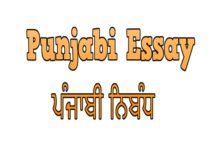
Absolute-Study
Hindi Essay, English Essay, Punjabi Essay, Biography, General Knowledge, Ielts Essay, Social Issues Essay, Letter Writing in Hindi, English and Punjabi, Moral Stories in Hindi, English and Punjabi.
One Response
It’s good
Save my name, email, and website in this browser for the next time I comment.
Rabindranath Tagore “ਰਬਿੰਦਰਨਾਥ ਟੈਗੋਰ” Punjabi Essay, Paragraph for Class 6, 7, 8, 9, 10 Students.
ਰਬਿੰਦਰਨਾਥ ਟੈਗੋਰ
Rabindranath Tagore
ਰਬਿੰਦਰਨਾਥ ਟੈਗੋਰ, ਇੱਕ ਮਹਾਨ ਭਾਰਤੀ ਕਵੀ, ਦਾ ਜਨਮ 7 ਤਾਰੀਖ ਨੂੰ ਹੋਇਆ ਸੀ ਮਈ 1861 ਵਿਚ ਕਲਕੱਤਾ, ਭਾਰਤ ਵਿਖੇ ਦੇਬੇਂਦਰਨਾਥ ਟੈਗੋਰ ਅਤੇ ਸ਼ਾਰਦਾ ਦੇਵੀ ਨੂੰ । ਉਹ ਸੀ ਇੱਕ ਅਮੀਰ ਅਤੇ ਸੱਭਿਆਚਾਰਕ ਬ੍ਰਾਹਮਣ ਪਰਿਵਾਰ ਵਿੱਚ ਪੈਦਾ ਹੋਇਆ। ਉਸ ਨੇ ਆਪਣੀ ਸ਼ੁਰੂਆਤੀ ਸਿੱਖਿਆ ਘਰ ਵਿੱਚ ਲਈ ਨਿੱਜੀ ਅਧਿਆਪਕਾਂ ਦੇ ਅਧੀਨ ਅਤੇ ਕਦੇ ਵੀ ਸਕੂਲ ਨਹੀਂ ਗਿਆ ਪਰ ਉਹ ਇਸ ਲਈ ਇੰਗਲੈਂਡ ਚਲਾ ਗਿਆ ਉਚੇਰੀ ਪੜ੍ਹਾਈ। ਉਸਨੇ ਆਪਣੀ ਅੱਠ ਸਾਲ ਦੀ ਛੋਟੀ ਉਮਰ ਵਿੱਚ ਹੀ ਕਵਿਤਾਵਾਂ ਲਿਖਣੀਆਂ ਸ਼ੁਰੂ ਕਰ ਦਿੱਤੀਆਂ ਸਨ। ਉਸ ਦੀ ਕਵਿਤਾ ਭਾਨੂਸ਼ਿਂਘੋ (ਸਨ ਲਾਇਨ) ਦੇ ਉਪਨਾਮ ਹੇਠ ਪ੍ਰਕਾਸ਼ਿਤ ਕੀਤਾ ਗਿਆ ਸੀ ਜਦੋਂ ਉਹ ਹੁਣੇ ਹੁਣੇ ਸੀ ਸੋਲਾਂ । ਉਹ 1878 ਵਿੱਚ ਕਾਨੂੰਨ ਦੀ ਪੜ੍ਹਾਈ ਕਰਨ ਲਈ ਇੰਗਲੈਂਡ ਚਲਾ ਗਿਆ ਪਰ ਇਸ ਤੋਂ ਪਹਿਲਾਂ ਹੀ ਭਾਰਤ ਵਾਪਸ ਆ ਗਿਆ। ਇੱਕ ਕਵੀ ਅਤੇ ਲੇਖਕ ਵਜੋਂ ਕੈਰੀਅਰ ਨੂੰ ਅੱਗੇ ਵਧਾਉਣ ਲਈ ਪੂਰਾ ਕਰਨਾ।
ਉਸ ਨੇ ਆਪਣੇ ਕੰਮ ਗੀਤਾਂਜਲੀ ਦਾ ਅੰਗਰੇਜ਼ੀ ਵਿੱਚ ਅਨੁਵਾਦ ਕੀਤਾ ਇੰਗਲੈਂਡ ਦੀ ਲੰਬੀ ਸਮੁੰਦਰੀ ਯਾਤਰਾ। ਉਸ ਨੂੰ ਸਾਹਿਤ ਲਈ ਨੋਬਲ ਪੁਰਸਕਾਰ ਨਾਲ ਸਨਮਾਨਿਤ ਕੀਤਾ ਗਿਆ ਸੀ ਸਾਲ ਦੇ ਅੰਦਰ ਹੀ ਉਸ ਦੀ ਗੀਤਾਂਜਲੀ ਪ੍ਰਕਾਸ਼ਿਤ ਹੋਈ। ਉਸ ਨੇ ਰਹੱਸਵਾਦ ਦਾ ਜ਼ਿਕਰ ਕੀਤਾ ਹੈ ਅਤੇ ਉਸ ਦੀ ਲਿਖਤ ਵਿੱਚ ਭਾਰਤੀ ਸੰਸਕ੍ਰਿਤੀ ਦੀ ਭਾਵਨਾਤਮਕ ਸੁੰਦਰਤਾ, ਜਿਸ ਲਈ ਇੱਕ ਗੈਰ-ਪੱਛਮੀ ਨੂੰ ਪਹਿਲੀ ਵਾਰ ਵੱਕਾਰੀ ਪੁਰਸਕਾਰ ਨਾਲ ਸਨਮਾਨਿਤ ਕੀਤਾ ਗਿਆ ਸੀ। ਇੱਕ ਮਸ਼ਹੂਰ ਹੋਣ ਦੇ ਨਾਲ-ਨਾਲ ਕਵੀ, ਉਹ ਇੱਕ ਪ੍ਰਤਿਭਾਵਾਨ, ਲੇਖਕ, ਨਾਵਲਕਾਰ, ਦ੍ਰਿਸ਼ਟਾਂਤਕ ਕਲਾਕਾਰ, ਸੰਗੀਤਕਾਰ ਵੀ ਸੀ, ਨਾਟਕਕਾਰ, ਅਤੇ ਇੱਕ ਦਾਰਸ਼ਨਿਕ। ਉਹ ਚੰਗੀ ਤਰ੍ਹਾਂ ਜਾਣਦਾ ਸੀ ਕਿ ਭਾਸ਼ਾ ਉੱਤੇ ਕਮਾਂਡ ਕਿਵੇਂ ਕਰਨੀ ਹੈ ਜਦਕਿ ਕਵਿਤਾ ਜਾਂ ਕਹਾਣੀਆਂ ਲਿਖਣਾ। ਉਹ ਇੱਕ ਚੰਗਾ ਦਾਰਸ਼ਨਿਕ ਸੀ ਜਿਸ ਰਾਹੀਂ ਉਸਨੇ ਪ੍ਰਭਾਵਿਤ ਕੀਤਾ ਸੁਤੰਤਰਤਾ ਸੰਗਰਾਮ ਦੌਰਾਨ ਭਾਰਤੀ ਲੋਕਾਂ ਦੀ ਇੱਕ ਵਿਸ਼ਾਲ ਸ਼੍ਰੇਣੀ।
ਭਾਰਤੀ ਸਾਹਿਤ ਪ੍ਰਤੀ ਉਨ੍ਹਾਂ ਦਾ ਯੋਗਦਾਨ ਬਹੁਤ ਵਿਸ਼ਾਲ ਹੈ। ਅਤੇ ਨਾ ਭੁੱਲਣਯੋਗ ਹੈ। ਉਸ ਦੇ ਰਬਿੰਦਰ ਸੰਗੀਤ ਦੇ ਦੋ ਗਾਣੇ ਇਸ ਤਰ੍ਹਾਂ ਵਧੇਰੇ ਮਸ਼ਹੂਰ ਹਨ ਉਹ ਦੋ ਦੇਸ਼ਾਂ ਦਾ ਰਾਸ਼ਟਰੀ ਗੀਤ ਰਹੇ ਹਨ ਜਿਵੇਂ ਕਿ “ਅਮਰ ਸ਼ੋਨਰੀ ਬੰਗਲਾ” (ਬੰਗਲਾਦੇਸ਼ ਦਾ ਰਾਸ਼ਟਰੀ ਗੀਤ) ਅਤੇ “ਜਨ ਗਣਮਾਨ” (ਭਾਰਤ ਦਾ ਰਾਸ਼ਟਰੀ ਗੀਤ) ਸ਼ਾਮਲ ਹਨ। ਉਸ ਦੀਆਂ ਸਿਰਜਣਾਤਮਕ ਲਿਖਤਾਂ, ਭਾਵੇਂ ਉਹ ਕਵਿਤਾ ਜਾਂ ਕਹਾਣੀਆਂ ਦੇ ਰੂਪ ਵਿੱਚ ਹੋਣ, ਨੂੰ ਚੁਣੌਤੀ ਨਹੀਂ ਦਿੱਤੀ ਜਾਂਦੀ ਅੱਜ ਵੀ। ਸ਼ਾਇਦ ਉਹ ਪਹਿਲਾ ਵਿਅਕਤੀ ਸੀ ਜੋ ਪੱਛਮ ਅਤੇ ਪੂਰਬ ਵਿਚਲੇ ਪਾੜੇ ਨੂੰ ਪੂਰਾ ਕਰਦਾ ਹੈ ਉਸ ਦੀਆਂ ਪ੍ਰਭਾਵਸ਼ਾਲੀ ਲਿਖਤਾਂ ਰਾਹੀਂ।
ਉਸ ਦੀ ਇੱਕ ਹੋਰ ਰਚਨਾ ਪੁਰਵੀ ਸੀ ਜਿਸ ਵਿੱਚ ਉਸਨੇ ਜ਼ਿਕਰ ਕੀਤਾ ਸੀ ਸਮਾਜਿਕ, ਨੈਤਿਕ, ਵਰਗੇ ਕਈ ਵਿਸ਼ਿਆਂ ਅਧੀਨ ਸ਼ਾਮ ਦੇ ਗੀਤ ਅਤੇ ਸਵੇਰ ਦੇ ਗੀਤ, ਸੱਭਿਆਚਾਰਕ, ਧਾਰਮਿਕ, ਰਾਜਨੀਤਕ, ਆਦਿ। ਮਾਨਸੀ ਨੂੰ ਉਸ ਨੇ 1890 ਵਿੱਚ ਲਿਖਿਆ ਸੀ ਜਿਸ ਵਿੱਚ ਉਸ ਨੇ ਕੁਝ ਸਮਾਜਿਕ ਅਤੇ ਕਾਵਿਕ ਕਵਿਤਾਵਾਂ ਇਕੱਠੀਆਂ ਕੀਤੀਆਂ। ਉਸ ਦੀਆਂ ਜ਼ਿਆਦਾਤਰ ਲਿਖਤਾਂ ਇਸ ‘ਤੇ ਆਧਾਰਿਤ ਸਨ ਬੰਗਾਲ ਦੇ ਲੋਕਾਂ ਦੀ ਜ਼ਿੰਦਗੀ। ਇੱਕ ਹੋਰ ਲਿਖਤ ਜਿਸਦਾ ਨਾਮ ਗੈਲਪਾਗੂਚਾ ਸੀ, ਇੱਕ ਸੀ ਦੀ ਗਰੀਬੀ, ਪੱਛੜੇਪਨ ਅਤੇ ਅਨਪੜ੍ਹਤਾ ‘ਤੇ ਆਧਾਰਿਤ ਕਹਾਣੀਆਂ ਦਾ ਸੰਗ੍ਰਹਿ ਭਾਰਤੀ ਲੋਕ। ਹੋਰ ਕਾਵਿ ਸੰਗ੍ਰਹਿ ਹਨ ਜਿਵੇਂ ਕਿ ਸੋਨਾਰ ਤਾਰੀ, ਕਲਪਨਾ, ਚਿਤਰਾ, ਨਾਇਦਿਆ ਆਦਿ ਅਤੇ ਨਾਵਲ ਗੋਰਾ, ਚਿਤਰਾਂਗਦਾ ਅਤੇ ਮਾਲਿਨੀ, ਬਿਨੋਦਿਨੀ ਅਤੇ ਵਰਗੇ ਹਨ। ਨੌਕਾ ਦੁਬਈ, ਰਾਜਾ ਅਤੇ ਰਾਣੀ ਆਦਿ। ਉਹ ਬਹੁਤ ਧਾਰਮਿਕ ਅਤੇ ਅਧਿਆਤਮਕ ਆਦਮੀ ਸੀ ਜੋ ਸੰਕਟ ਦੇ ਦਿਨਾਂ ਵਿਚ ਉਸ ਦੀ ਬਹੁਤ ਮਦਦ ਕੀਤੀ। ਉਹ ਇੱਕ ਮਹਾਨ ਸਿੱਖਿਆ ਸ਼ਾਸਤਰੀ ਸੀ ਇਸ ਲਈ ਉਹ ਸ਼ਾਂਤੀ ਦੇ ਨਿਵਾਸ ਸਥਾਨ, ਸ਼ਾਂਤੀਨਿਕੇਤਨ ਨਾਮ ਦੀ ਇੱਕ ਵਿਲੱਖਣ ਯੂਨੀਵਰਸਿਟੀ ਦੀ ਸਥਾਪਨਾ ਕੀਤੀ। ਉਹ ਇਸ ‘ਤੇ ਮਰ ਗਿਆ ਭਾਰਤ ਦੀ ਅਜ਼ਾਦੀ ਦੇਖਣ ਤੋਂ ਪਹਿਲਾਂ 7 ਵਿੱਚ 1941 ਅਗਸਤ ਨੂੰ ਕੋਲਕਾਤਾ ਵਿੱਚ।
Related Posts
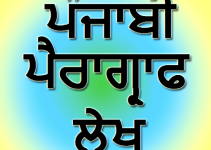
punjabi_paragraph
PunjabiParagraph.com ਸਿੱਖਿਆ ਦੇ ਪੋਰਟਲ ਵਿੱਚ ਤੁਹਾਡਾ ਸੁਆਗਤ ਹੈ। ਸਾਡਾ ਉਦੇਸ਼ ਅੰਤਰਰਾਸ਼ਟਰੀ ਸੱਤਰ ‘ਤੇ ਪੰਜਾਬੀ ਭਾਸ਼ਾ ਨੂੰ ਹਰ ਵਿਦਿਆਰਥੀ ਤੱਕ ਪਹੁੰਚਯੋਗ ਬਣਾਉਣਾ ਹੈ। ਇਸ ਟੀਚੇ ਨਾਲ ਅਸੀਂ ਇਸ ਵਿਦਿਅਕ ਪੋਰਟਲ ‘ਤੇ ਰੋਜ਼ਾਨਾ ਲਾਭਦਾਇਕ ਸਮੱਗਰੀ ਜਿਵੇਂ ਕਿ ਪੰਜਾਬੀ ਪੈਰੇ, ਪੰਜਾਬੀ ਲੇਖ, ਪੰਜਾਬੀ ਭਾਸ਼ਣ ਆਦਿ ਨੂੰ ਅਪਲੋਡ ਕਰ ਰਹੇ ਹਾਂ। ਸਾਡਾ ਪਹਿਲਾ ਟੀਚਾ ਹੈ ਕਿ ਵੱਧ ਤੋਂ ਵੱਧ ਵਿਦਿਆਰਥੀ ਇਸ ਵੈੱਬਸਾਈਟ ਤੋਂ ਲਾਭ ਉਠਾਉਣ। ਤੁਹਾਡਾ ਧੰਨਵਾਦ।
Save my name, email, and website in this browser for the next time I comment.
- Privacy Policy

- ਪੰਜਾਬੀ-ਨਿਬੰਧ
- Punjabi Grammar
- ਪੰਜਾਬੀ-ਭਾਸ਼ਾ
- ਪੰਜਾਬੀ ਪੇਪਰ
- ਕਹਾਣੀਆਂ
- ਵਿਆਕਰਣ
- Letter Writing
Punjabi Essay, Paragraph on "Rabindranath Tagore", "ਰਾਬਿੰਦਰ ਨਾਥ ਟੈਗੋਰ " for Class 8, 9, 10, 11, 12 PSEB, CBSE Students.
ਰਾਬਿੰਦਰ ਨਾਥ ਟੈਗੋਰ rabindranath tagore.
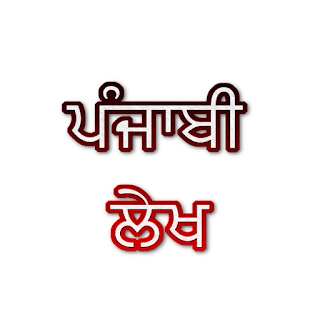
ਸਾਡੇ ਦੇਸ਼ ਦੇ ਕੌਮੀ ਗੀਤ 'ਜਨ ਗਣ ਮਨ' ਦੇ ਲੇਖਕ ਅਤੇ ਉੱਘੇ ਨੇਬਲ ਪੁਰਸਕਾਰ ਜੇਤੂ ਕਵੀ ਰਾਬਿੰਦਰ ਨਾਥ ਟੈਗੋਰ ਦਾ ਨਾਂ ਕੌਣ ਨਹੀਂ ਜਾਣਦਾ। ਉਨ੍ਹਾਂ ਦੀਆਂ ਲਿਖਤਾਂ ਸਾਰੇ ਦੇਸ਼ ਵਾਸੀ ਬੜੀ ਰੁਚੀ ਨਾਲ ਪੜਦੇ ਹਨ। ਉਹ ਅਣਖੀਲੇ ਭਾਰਤੀ ਸਨ ਜਿਨਾਂ ਨੇ ਜਲਿਆਂ ਵਾਲੇ ਬਾਗ ਦੇ ਸਾਕੇ ਕਰਕੇ ਅੰਗਰੇਜ਼ਾਂ ਵੱਲੋਂ ਦਿੱਤੇ ‘ਸਰ’ ਦੇ ਖਿਤਾਬ ਨੂੰ ਮੋੜ ਦਿੱਤਾ ਸੀ ।
ਟੈਗੋਰ ਦਾ ਜਨਮ 7 ਮਈ, 1861 ਈ: ਨੂੰ ਕਲਕੱਤਾ ਦੇ ਇਕ ਧਨਾਢੇ ਪਰਿਵਾਰ ਵਿਚ ਹੋਇਆ। ਉਹਨਾਂ ਨੂੰ ਘਰ ਵਿਚ ਹੀ ਸਾਹਿਤਕ ਅਤੇ ਕਲਾਮਈ ਵਾਤਾਵਰਣ ਪ੍ਰਾਪਤ ਹੋਇਆ । ਉਨ੍ਹਾਂ ਨੂੰ ਖੁਲਆਂ ਤੇ ਕੁਦਰਤੀ ਸ਼ਾਂ ਵਾਲੀਆਂ ਥਾਵਾਂ ਬਹੁਤ ਪਸੰਦ ਸਨ । ਉਨਾਂ ਆਪਣੇ ਜੀਵਨ ਵਿਚ ਕਈ ਕੁਦਰਤੀ ਥਾਵਾਂ ਦੀ ਯਾਤਰਾ ਕਤੀ। ਉਹ ਅੰਮ੍ਰਿਤਸਰ ਦਰਬਾਰ ਸਾਹਿਬ ਵੀ ਆਏ| ਉਹ ਇਥੋਂ ਦੇ ਵਾਤਾਵਰਨ ਤੋਂ ਬੜੇ ਪ੍ਰਭਾਵਿਤ ਹੋਏ ਤੇ ਕਿੰਨਾ ਚਿਰ ਮੰਤਰ ਮੁਗਧ ਤੇ ਰਸ ਭਿੰਨੇ ਕੀਰਤਨ ਦਾ ਲੁਤਫ ਉਠਾਂਦੇ ਰਹੇ ।
ਉਹਨਾਂ ਨੇ ਮੁੱਢਲੀ ਵਿਦਿਆ ਜ਼ਿਆਦਾਤਰ ਘਰ ਵਿਚ ਹੀ ਹਾਸਲ ਕੀਤੀ ਸੀ। ਉਹਨਾਂ ਨੇ ਆਪਣੀ ਮਾਂ ਬੋਲੀ ਬੰਗਾਲੀ ਵਿਚ ਸਾfਹਤ ਦੇ ਹਰ ਰੂਪ ਕਵਿਤਾ, ਨਾਵਲ, ਨਾਟਕ, ਇਕਾਂਗੀ, ਕਹਾਣੀ ਤੇ ਨਿਬੰਧ ਦੀ ਰਚਨਾ ਕੀਤੀ ਪਰ ਉਨ੍ਹਾਂ ਨੂੰ ਵਧੇਰੇ ਪ੍ਰਸਿੱਧੀ ਕਵੀ ਦੇ ਰੂਪ ਵਿਚ ਹੀ ਮਿਲੀ । ਉਨ੍ਹਾਂ ਦੇ ਮਹਾਨ ਕਾਵਿ-ਸੰਗ੍ਰਹਿ ਗੀਤਾਂਜਲੀ ਨੂੰ 1913 ਵਿਚ ਪ੍ਰਸਿੱਧ ਨੰਬਲ ਪੁਰਸਕਾਰ ਪ੍ਰਾਪਤ ਹੋਇਆ| ਇਸ ਨਾਲ ਉਨਾਂ ਦਾ ਨਾਂ ਸਾਰੀ ਦੁਨੀਆਂ ਵਿਚ ਪ੍ਰਸਿੱਧ ਹੋ ਗਿਆ। ਉਹਨਾਂ ਨੇ ਬਚਿਆਂ ਲਈ ਵੀ ਸਾਹਿਤ ਦੀ ਰਚਨਾ ਕੀਤੀ। ਉਨਾਂ ਦੀ ਜੁਗਤ ਪ੍ਰਸਿੱਧ ਕਹਾਣੀ ਕਾਬਲੀ ਵਾਲਾ ਉੱਤੇ ਫਿਲਮ ਵੀ ਬਣ ਚੁੱਕੀ ਹੈ । ਉਹਨਾਂ ਦੀਆਂ ਕੁਝ ਮੁੱਖ ਰਚਨਾਵਾਂ ਹਨ-ਗੀਤਾਂਜਲੀ (ਕਵਿਤਾ), ਗੋਹਾ (ਨਾਵਲ) ਤੇ ਡਾਕਘਰ (ਨਾਟਕ) ਆਦਿ । ਟੈਗੋਰ ਸਾਹਿਤ ਤੋਂ ਬਿਨਾਂ ਚਿੱਤਰ ਕਲਾ ਦੇ ਖੇਤਰ ਵਿਚ ਖਾਸ ਥਾਂ ਰੱਖਦੇ ਹਨ। ਸੰਗੀਤ ਵਿਚ ਉਨਾਂ ਦੀਆਂ ਧੁਨਾਂ ਰਵਦ ਸੰਗੀਤ ਵਜੋਂ ਪ੍ਰਸਿੱਧ ਹਨ ।
ਰਾਬਿੰਦਰ ਨਾਥ ਟੈਗੋਰ ਦੀ ਸਿਖਿਆ ਖੇਤਰ ਵਿਚ ਵੀ ਖਾਸ ਥਾਂ ਹੈ । ਬਚਪਨ ਵਿਚ ਉਹ ਆਪਣੇ ਸਮੇਂ ਦੀ ਸਕੂਲ ਸਿੱਖਿਆ ਦੇ ਢੰਗ ਤੋਂ ਸੰਤੁਸ਼ਟ ਨਹੀਂ ਸਨ। ਵਿਦਆ ਬਾਰੇ ਉਨ੍ਹਾਂ ਦੇ ਮਨ ਵਿਚ ਜਿਹੜਾ ਸਪਨਾ ਬਣਿਆ ਹੋਇਆ ਸੀ ਉਹ ਉਨ੍ਹਾਂ ਨੇ 1901 ਵਿਚ ਸ਼ਾਂਤੀ ਨਿਕੇਤਨ ਦਾ ਸਕੂਲ ਸਥਾਪਿਤ ਕਰਕੇ ਸਾਕਾਰ ਕੀਤਾ । ਇਸ ਸਕੂਲ ਦੀਆਂ ਖਾਸ ਗੱਲਾਂ ਵਿਚ ਮਾਂ ਬੋਲੀ ਵਿਚ ਪੜਾਈ, ਪਾਠਕ੍ਰਮ ਵਿੱਚ ਵੱਖਵੱਖ ਕਲਾਵਾਂ ਨੂੰ ਵਿਸ਼ੇਸ਼ ਥਾਂ ਅਤੇ ਕੁਦਰਤ ਦੇ ਸੁਹਜ ਵਿਚ ਜੀਉਣਾ ਸ਼ਾਮਲ ਸਨ। ਅੱਜ-ਕਲ੍ਹ ਸ਼ਾਂਤੀ ਨਿਕੇਤਨ ਵਿਸ਼ਵ ਵਿਦਿਆਲਾ ਹੈ । ਟੈਗੋਰ ਦੇ ਦਿਲ ਵਿਚ ਆਪਣੀ ਮਾਂ-ਬਲੀ,ਲਈ ਬੜਾ ਪਿਆਰ ਸੀ। ਉਹ ਹੋਰ ਪ੍ਰਾਂਤ ਦੇ ਲੇਖਕਾਂ ਨੂੰ ਵੀ ਆਪੋਆਪਣੀ ਮਾਂ ਬੋਲੀ ਵਿਚ fਖਣ ਲਈ ਪ੍ਰੇਰਦੇ ਸਨ । ਪ੍ਰਸਿੱਧ ਅਭਿਨੇਤਾ ਤੇ ਲੇਖਕ ਬਲਰਾਜ ਸਾਹਨੀ, ਅਤੇ ਨਾਟਕਕਾਰ ਬਲਵੰਤ ਗਾਰਗੀ ਨੂੰ ਆਪਣੀ ਮਾਂ-ਬੋਲੀ ਪੰਜਾਬੀ ਵਿਚ ਲਿਖਣ ਲਈ ਉਹਨਾਂ ਨੇ ਉਤਸਾਹਿਤ ਕੀਤਾ। ਉਹਨਾਂ ਦਾ ਪੱਕਾ ਵਿਸ਼ਵਾਸ ਸੀ ਕਿ ਮਾਂ-ਬੋਲੀ ਵਿਚ ਦਿੱਤੀ ਸਿੱਖਿਆ ਹੀ ਸਭ ਤੋਂ ਵੱਧ ਅਸਰਦਾਰ ਹੁੰਦੀ ਹੈ ।
ਉਹਨਾਂ ਦੀ ਮਹਾਨਤਾ ਅੱਗੇ ਅੰਗਰੇਜ਼ ਸਰਕਾਰ ਵੀ ਸਿਰ ਝੁਕਾਉਂਦੀ ਸੀ। ਸਰਕਾਰ ਵਲੋਂ ਉਹਨਾਂ ਨੂੰ ਸਰ’ ਦਾ ਖਿਤਾਬ ਦਿੱਤਾ ਗਿਆ ਸੀ । ਪਰ ਉਹਨਾਂ ਲਈ ਕੋਈ ਵੀ ਸਨਮਾਨ ਆਪਣੇ ਪਿਆਰੇ ਭਾਰਤ ਦੀ ਅਣਖ ਕਾਇਮ ਰੱਖਣ ਨਾਲੋਂ ਵੱਡਾ ਨਹੀਂ ਸੀ। ਜਦੋਂ 13 ਅਪ੍ਰੈਲ, 1919 ਨੂੰ ਅੰਮ੍ਰਿਤਸਰ ਵਿਖੇ ਜਲਿਆਂ ਵਾਲਾ ਬਾਗ ਵਿਚ ਅੰਗਰੇਜ਼ਾਂ ਵਲੋਂ ਨਿਹੱਥੇ ਭਾਰਤੀਆਂ ਉੱਤੇ ਗੋਲੀ ਚਲਾਈ ਗਈ, ਤਾਂ ਇਸ ਖੂਨੀ ਸਾਕੇ ਨੂੰ ਸੁਣ ਕੇ ਉਹਨਾਂ ਦੀ ਰੂਹ ਕੰਬ ਉੱਠੀ। ਉਹਨਾਂ ਨੂੰ ਅਜਿਹੀ ਜ਼ਾਲਮ ਸਰਕਾਰ ਵਲੋਂ ਦਿੱਤਾ ‘ਸਰ ਦਾ ਸਨਮਾਨ ਇਕ ਬੱਝ ਜਾਪਿਆ । ਇਸ ਲਈ ਉਹਨਾਂ ਨੇ ਇਹ ਖਿਤਾਬ ਰੋਸ ਵਜੋਂ ਮੋੜ ਦਿੱਤਾ।
ਰਾਬਿੰਦਰ ਨਾਥ ਟੈਗੋਰ ਨੇ ਕਦੇ ਵੀ ਸਰਗਰਮ ਰਾਜਨੀਤੀ ਵਿਚ ਭਾਗ ਨਹੀਂ ਲਿਆ ! ਭਾਰਤ ਦੇ ਮਹਾਨ ਨੇਤਾ ਉਹਨਾਂ ਦਾ ਬਹੁਤ ਸਨਮਾਨ ਕਰਦੇ ਸਨ । ਮਹਾਤਮਾ ਗਾਂਧੀ ਤਾਂ ਉਹਨਾਂ ਨੂੰ ਸਤਿਕਾਰ ਨਾਲ ਗੁਰਦੇਵ ਕਹਿੰਦੇ ਸਨ । ਰਾਬਿੰਦਰ ਨਾਥ ਟੈਗੋਰ ਦਾ 1941 ਵਿਚ ਦੇਹਾਂਤ ਹੋ ਗਿਆ ।
ਸਮੁੱਚੇ ਤੌਰ ਤੇ ਟੇਗਰ ਇਕ: ਮਹਾਨ ਸਾਹਿਤਕਾਰ ਸਨ । ਉਹਨਾਂ ਨੇ ਆਪਣੀ ਬਹੁਤੀ ਰਚਨਾ ਆਪਣੀ ਮਾਂ-ਬੋਲੀ ਬੰਗਾਲੀ ਵਿਚ ਕੀਤੀ । ਉਹਨਾਂ ਨੇ ਮਨੁੱਖ ਨੂੰ ਜਾਤ-ਪਾਤ, ਰੰਗ, ਨਸਲ ਆਦਿ ਵਿਤਕਰਿਆਂ ਤੋਂ ਉੱਚਾ ਉਠਣ ਦੀ ਪ੍ਰੇਰਨਾ ਦਿੱਤੀ । ਉਹਨਾਂ ਦੀਆਂ ਰਚਨਾਵਾਂ ਵਿਚ ਆਜ਼ਾਦੀ ਲਈ ਲੜਦੇ ਭਾਰਤੀਆਂ ਦੀਆਂ ਭਾਵਨਾਵਾਂ, ਕੌਮੀ ਏਕਤਾ ਤੇ ਵਿਸ਼ਵ ਏਕਤਾ ਦੇ ਭਾਵ ਇਕਸਾਰ ਹੋਏ ਹਨ।
You may like these posts
Post a comment.
VERY GOOD PUNJABI GARRAMER YOU ARE MY IN MY FAVERET LINK I KNOW MY SPELLIN IS VERY BAD 😒😒😒😒
ਬਹੁਤ ਵਧੀਆ !
bahut vadhiya !
Thanks ☺️☺️

- English to Punjabi Keyboard tool
Categories - ਸ਼੍ਰੇਣੀਆਂ
- Punjabi Letter
- Punjabi-Essay
- Punjabi-Grammar
- Punjabi-Language
- ਪੰਜਾਬੀ-ਕਹਾਣੀਆਂ
Popular Posts - ਪ੍ਰਸਿੱਧ ਪੋਸਟ

Punjabi Essay, Paragraph on "Diwali", "ਦੀਵਾਲੀ " for Class 8, 9, 10, 11, 12 of Punjab Board, CBSE Students in Punjabi Language.

Punjabi Essay on "Shri Guru Gobind Singh Ji", "ਸ੍ਰੀ ਗੁਰੂ ਗੋਬਿੰਦ ਸਿੰਘ ਜੀ " Punjabi Paragraph-Lekh-Speech for Class 8, 9, 10, 11, 12 Students.

Punjabi Essay on "Computer de Labh ate Haniya", "ਕੰਪਿਊਟਰ ਦੇ ਲਾਭ ਅਤੇ ਹਣਿਆ " Punjabi Paragraph-Lekh-Speech for Class 8, 9, 10, 11, 12 Students.
Tags - ਟੈਗਸ.
- Akbar-Birbal-Story
- Dosti Status
- Facebook-Status
- Instagram-Status
- Letter-to-Editor
- Punjabi Application
- Punjabi Family Letter
- Punjabi formal Letter
- Punjabi Informal Letter
- Punjabi_Folk_Wisdom
- Punjabi_Idioms
- Punjabi-Lekh
- Punjabi-Moral-Stories
- Punjabi-Paragraph
- Punjabi-Sample-Paper
- Punjabi-Speech
- Punjabi-Status
- Punjabi-Synonyms
- Punjabi-Vyakaran
- Short-Stories-Punjabi
- Tenali-Rama-Story
- Unseen-Paragraph
- WhatsApp-Status
- ਅਣਡਿੱਠਾ ਪੈਰਾ
- ਆਂਪੰਜਾਬੀ ਪੱਤਰ
- ਸੱਦਾ-ਪੱਤਰ
- ਸਮਾਨਾਰਥਕ-ਸ਼ਬਦ
- ਦੋਸਤੀ ਸਟੇਟਸ
- ਪੰਜਾਬੀ ਚਿੱਠੀ
- ਪੰਜਾਬੀ ਚਿੱਠੀਆਂ
- ਪੰਜਾਬੀ ਪੱਤਰ
- ਪੰਜਾਬੀ-ਸਟੇਟਸ
- ਪੰਜਾਬੀ-ਪਰਾਗ੍ਰਾਫ
- ਪੰਜਾਬੀ-ਲੇਖ
- ਪੰਜਾਬੀ-ਵਿਆਕਰਣ
- ਪੱਤਰ ਲੇਖਨ
- ਮੁਹਾਵਰੇ
- ਲੋਕ_ ਅਖਾਣ
- ਲੋਕ_ਸਿਆਣਪਾਂ
Grammar - ਵਿਆਕਰਣ
- 1. ਮੁਹਾਵਰੇ, ਅਖਾਣ ਤੇ ਉਨਾਂ ਦੀ ਵਰਤੋਂ
- 2. ਪੰਜਾਬੀ ਭਾਸ਼ਾ ਵਿੱਚ ਅਗੇਤਰ-ਪਿਛੇਤਰ ਦੀ ਜਾਣ -ਪਛਾਣ
- 3. ਪੰਜਾਬੀ ਭਾਸ਼ਾ ਵਿੱਚ ਨਾਂਵ ਦੀ ਜਾਣ -ਪਛਾਣ
- 4. ਪੰਜਾਬੀ ਭਾਸ਼ਾ ਵਿੱਚ ਪੜਨਾਂਵ ਦੀ ਜਾਣ -ਪਛਾਣ
- 5. ਪੰਜਾਬੀ ਭਾਸ਼ਾ ਵਿੱਚ ਵਿਸ਼ੇਸ਼ਣ ਦੀ ਜਾਣ -ਪਛਾਣ
- 6. ਪੰਜਾਬੀ ਭਾਸ਼ਾ ਵਿੱਚ ਕਿਰਿਆ ਦੀ ਜਾਣ -ਪਛਾਣ
- 7. ਪੰਜਾਬੀ ਭਾਸ਼ਾ ਵਿੱਚ ਸੰਬੰਧਕ ਦੀ ਜਾਣ -ਪਛਾਣ
- 8. ਪੰਜਾਬੀ ਭਾਸ਼ਾ ਵਿੱਚ ਵਿਸਮਿਕ ਦੀ ਜਾਣ -ਪਛਾਣ
- 9. ਪੰਜਾਬੀ ਭਾਸ਼ਾ ਵਿੱਚ ਵਿਸਰਾਮ ਚਿੰਨ੍ਹ ਦੀ ਜਾਣ -ਪਛਾਣ
- Continue Reading...
Popular Links - ਮਹੱਤਵਪੂਰਨ ਲਿੰਕ
- ਪੰਜਾਬੀ ਵਿਆਕਰਣ
- ਪੰਜਾਬੀ ਨਮੂਨਾ ਪੇਪਰ
Menu Footer Widget


- Punjabi Poetry
- Sufi Poetry
- Urdu Poetry
- Hindi Poetry
- Translations
‘ਪੰਜਾਬੀ ਕਵਿਤਾ’ ਵਿਹੜੇ ਮਨਜੀਤ ਰਾਜਪੁਰਾ
Rabindranath tagore ਰਾਬਿੰਦਰ ਨਾਥ ਟੈਗੋਰ, rabindranath tagore ( 7may 1861 – 7 august 1941) who is also known as gurudev was a bengali author, musician, painter and thinker. his famous works are gitanjali, sonar tari, gora, visarjan, ghare baire, jivansmriti etc. he became the first non-european nobel laureate in 1913. we are presenting his gitanjali translated by ajaib chitarkar (a poet and an artist) and some other poems in punjabi. ਰਾਬਿੰਦਰ ਨਾਥ ਟੈਗੋਰ (੭ਮਈ ੧੮੬੧ – ੭ ਅਗਸਤ ੧੯੪੧), ਜਿਨ੍ਹਾਂ ਨੂੰ ਗੁਰੂਦੇਵ ਦੇ ਨਾਂ ਨਾਲ ਵੀ ਜਾਣਿਆ ਜਾਂਦਾ ਹੈ, ਪ੍ਰਸਿੱਧ ਬੰਗਾਲੀ ਲੇਖਕ, ਸੰਗੀਤਕਾਰ, ਚਿਤ੍ਰਕਾਰ ਅਤੇ ਵਿਚਾਰਕ ਸਨ । ਉਨ੍ਹਾਂ ਦੀਆਂ ਮਸ਼ਹੂਰ ਰਚਨਾਵਾਂ ਵਿੱਚ ਗੀਤਾਂਜਲੀ, ਸੋਨਾਰ ਤਰੀ, ਗੋਰਾ, ਵਿਸਰਜਨ, ਘਰੇ ਬਾਇਰੇ ਅਤੇ ਜੀਵਨਸਮ੍ਰਿਤੀ ਸ਼ਾਮਿਲ ਹਨ । ਉਹ ਪਹਿਲੇ ਗੈਰ-ਯੂਰਪੀ ਸਨ ਜਿਨ੍ਹਾਂ ਨੂੰ ੧੯੧੩ ਵਿੱਚ ਸਾਹਿਤ ਲਈ ਨੋਬਲ ਇਨਾਮ ਦਿੱਤਾ ਗਿਆ । ਉਨ੍ਹਾਂ ਦੀ ਕਾਵਿ ਰਚਨਾ ਗੀਤਾਂਜਲੀ ਨੂੰ ਪੰਜਾਬੀ ਤੇ ਉਰਦੂ ਦੇ ਕਵੀ ਅਤੇ ਚਿਤ੍ਰਕਾਰ ਅਜਾਇਬ ਚਿਤ੍ਰਕਾਰ ਨੇ ਪੰਜਾਬੀ ਵਿੱਚ ਅਨੁਵਾਦ ਕੀਤਾ ਹੈ ।.

- Gitanjali : Translated by Ajaib Chitarkar
- Poems of Tagore translated in Punjabi
- Tagore Ate Punjab : Harpal Singh Pannu
- ਗੀਤਾਂਜਲੀ : ਅਨੁਵਾਦਕ ਅਜਾਇਬ ਚਿਤ੍ਰਕਾਰ
- ਰਾਬਿੰਦਰ ਨਾਥ ਟੈਗੋਰ ਦੀਆਂ ਪੰਜਾਬੀ ਵਿਚ ਅਨੁਵਾਦਿਤ ਕਵਿਤਾਵਾਂ
- ਟੈਗੋਰ ਅਤੇ ਪੰਜਾਬ : ਹਰਪਾਲ ਸਿੰਘ ਪੰਨੂ
- ਪੰਜਾਬੀ ਕਹਾਣੀਆਂ
Gitanjali Rabindranath Tagore
ਗੀਤਾਂਜਲੀ ਰਾਬਿੰਦਰ ਨਾਥ ਟੈਗੋਰ.
- Tere Man Vich Jikan Aaia
- Jad Toon Mainu Gaan De Laee Aakhia
- He Prana De Praan
- Ik Pal Hi Ner Tere Behan Di
- Tor Lai Nikka Phul Ih
- Geet Mere Gehne Laah Sutte Ne Door
- Baccha Jihra Saj Riha Shahi Vesan Naal
- Paagla Kar Modhian Te Bhar Chukan Da Yatan
- Jithe Nirdhan Deen Heene Te Nimaane Vasde
- Pandh Mera Hai Lammera
- Aaia Si Geet Gaavan
- Man Mere Dian Vaashna Beant Han
- Main Aaia Haan Ethe Kewal
- Mainu Jag-Mele 'Ch Shaamil Hon Da
- Prem De Hathan 'Ch Arpan Hon Laee
- Badal Te Badal Jurey
- Toon Na Bolein Chup Vi
- Os Din Jad Poore Joban Vich Si
- Aapni Beri Da Hun Langar Uthana Hi Pavega
- Ajj Mon Parbhaat Vich
- Mere Mitter Kis Piare De Mel Di Khatar
- Jekar Din Dhal Giaa
- Thak Tut Hoee Choor Raat Vich
- Baitha Uh Kol Aa Ke
- Chaanana-O Chaanana
- Meri Zanjeer Moh Di Sakhat Hai
- Apne Naan De Naal Main
- Tainu Milan Ikallra Aaia
- O Kaidi Kaun Si Uh
- Jihre Jag Vich Mainu Piaran
- Uh Mere Ghar Aaye
- Bhikhia Taithon He Maalik
- Jithe Man Vich Dar Nahin
- He Ki Mere Maalika
- Mere Man Vich Ik Din
- Mainu Teri Chah Hai
- Zindgi Da Jad Sarovar Suk Jaaye
- Pichhle Kaee Dina Ton Lai Ke
- Sabh Ton Pichhe Hat Kiun Piaare
- Ajj Savere Hi Kise Kiha
- Ik Dinhu Jad Main
- Meri Eho Hai Khushi
- Virak Pairan Di Nahin
- Kinne Chir Ton
- Takdian Us De Raah Val Hi
- Chup-Bhari Parbhat Da Saagar
- Toon Baitha Othe Apne Ucche
- Main Turda Us Pind De Raste
- Phail Gaye San Sanghne Nhere
- Ik Vaari Man Mera Keeta
- Lakh Tarian Ratnan Rangan
- Main Taithon Kujh Vi Na Mangia
- Jaag Jaagde He Insaan
- Sabbhe Khushian Terian
- O Chanan Mere Chanan
- Saari Ghul Mil Jaan De
- Haan Main Haan Ih Jaanda
- Lakh Dunian Da Saagar Kandha
- Neendar Suhal Malook Ih
- Mere Bacche Jad Tere Laee
- Kinnian Anjana De Naal Toon
- Us Ikant Nadi De Kandhe
- He Ki Mere Devta
- Apne Jiwan De Antim Geet
- Toon Hi Hain Aakash
- Aapnian Bahan Faila Ke
- Jiwan Dhara Jihri Meri
- Es Khushi De Veig Di
- Apne Aap Nu Vadda Jana
- Tiaag Dein Te Kul Jahan
- Din Mukia Ei
- Tere Tohfe Kol Aa Mere
- He Mere Jiwan De Suami
- Devta Tainu Samajh Ke
- Sirjana Si Srishat Di Jad Sajri
- Je Kar Is Jiwan Vich Mainu
- Ghum Rahi Aakash De Utte
- Aapne Vihle Dinan De Vich
- Mere Maalik Tere Hathan Vich
- Son Thaal Aj Tera Sajaaia
- Teri Viyog Peer Hi
- Apne Prabhu De Ghar Ton Aaye
- Tera Ajj Suneha Lai Ke
- Dil 'Ch Maghdi Aas Lai Ke
- Tutte Mandir De Devta
- Maalik Mere Di Ehi
- Dinhu Dhaley Jad Maut Ne Auna
- He Meri Zindgi Di
- Ih Main Jaana
- Mainu Jaan Di Chhuti Mil Gaee
- Is Vidaee De Samein Te
- Na Jaana Main Kad Jivan Di
- Is Vidaee De Samein Eho Kahan
- Rahe Jadon Tak Khed De
- Haar Apni Haar De
- Jad Beri De Chhad Dian Patwar
- Roop Ratnan De Bhare Saagar Di
- Main Apne Geetan De Duara
- Main Haan Tainu Jaanda
- He Maalik Toon Bakhash De
punjabi-kavita.com
Talk to our experts
1800-120-456-456
- An Essay On Renown Poet Rabindranath Tagore

Rabindranath Tagore Essay For Students And Children
Rabindranath Tagore is one of India’s most cherished renaissance figures, who has put us on the literary map of the world. He was a poet’s poet and a maker of not only modern Indian literature but also the modern Indian mind. Tagore was myriad-minded and a great poet, short story writer, novelist, dramatist, essayist, painter, and composer of songs. His worldwide acclaim as a social, political, religious and aesthetic thinker, an innovator in education and a champion of the ‘One World’ idea makes him a living presence. Gandhi called him the ‘Great Sentinel’. He was also renowned as Gurudev.
His Early Years
Rabindranath Tagore was born on May 6, 1861, in an affluent joint family at Jorasanko in Calcutta. His father Maharsi Debendranath Tagore was a religious reformer, scholar, and leader of Brahmo Samaj and his mother’s name was Sarada Devi. He was the youngest of thirteen children. He had spent most of his childhood with servants since his mother had passed away when he was very young. His home was the hub of literary and theatrical activities. In 1883, Rabindranath Tagore married Mrinalini Devi Raichaudhuri. He had two sons and three daughters.
In his childhood, Tagore never liked the school education within the four walls. He liked the outside world; the open sky overhead and the earth under his feet. So, he was educated at home by private tutors who taught him various subjects. English was his least favourite subject. His father guided him with Upanishads.
He extensively read the mystical and Vaishnav poets of India. From his early years, Rabindranath Tagore wrote poems. Some of his poems were published in periodicals when he was very young. He finished a long poem in Maithili style. His first short story in Bengali had the title, ‘Bhikharini’ (The Beggar Woman).
Tagore went to England for higher education but there also, he did not like the traditional system of education. He came back to India after a year. After he came back, he devoted himself completely to writing. Before he turned 18 years old, he had published more than 6000 lines of verse along with prose. He became an active member of the Bengal Literary Academy and frequently contributed to many periodicals. Bengal was swinging from the Renaissance in every field of religion, literature and politics when Rabindranath Tagore made his presence felt in the literary society.
He established a school named Shantiniketan at Bolpur (Birbhum district) in Bengal. In Shantiniketan, the teachers took classes under the trees with open sky overhead and green grass under the feet. The Gurukul pattern was followed in the school. Later, the school became a college and then a famous university under the name of “Visva-Bharati”. Today, students from different parts of the world come here to study.
His Contributions
Rabindranath Tagore wrote not only poems but also short stories, drama, novels and essays. He was awarded the world-famous Nobel prize for Literature for his famous book of poetry called ‘Gitanjali’ in 1913. The British Crown awarded him the Knighthood. However, he returned the award to mark the protest against the inhumane massacre in Jallianwala Bagh. Tagore has 2230 songs in his collection, which he composed and they are known as ‘Rabindra Sangeet’. Till today, the Bengalis sing his composed songs with pride. His famous novels like ‘Gora’ ‘Ghare-Baire’, ‘Noukadubi’, ‘Chokher Bali’ and many have been made into movies, which have won accolades worldwide.
Tagore also took up painting. He introduced a completely new form of art and his paintings were so exceptional that he won himself a very significant place among India’s
famous contemporary artists.
Into Politics
Rabindranath Tagore was writing at a time when the entire country was thrown into the fever of the freedom struggle and he plunged with deep passion into the struggle. He took part in the freedom movements by opening a Swadeshi shop selling only Indian goods and by rejecting foreign goods. He also composed many patriotic songs and articles especially during the painful partition of Bengal in 1905. Those songs inspired the youth of the country. He gave us the National Anthem: “Jana Gana Mana”. He had also composed the National anthem of Bangladesh: “Amar Sonar Bangla”. He also wrote the lyrics of Sri Lanka’s National Anthem.
Tagore died on August 7, 1941, at Calcutta leaving behind a legacy of world-class literature. He is one of the most influential Indian writers and so not only the nation but also the entire intellectual community of the world suffered an irreparable loss. The nation lost a great poet, philosopher, social reformer, mystic and a greater human being.
He was not only a representative of the nation but a wholesome product of Mother Earth, an amalgamation of Indian and modern values. Even though he is not among us, his presence can be felt through his vast works. His birthday is celebrated as Rabindra Jayanti in West Bengal. He will always be remembered as the source of inspiration for noble thoughts and great ideas for humanity.
Descriptive Essay
A descriptive essay is one in which a person, place, thing, or any object is explained in detail. It vividly describes the experience of the five senses about the subject. The subject can be anything – a thing, an experience, a situation, or an emotion or feeling. A good descriptive essay has the power to paint a picture through words . It can make the reader experience the subject first-hand in his mind – such is the power of a good descriptive essay. Great writers can describe a thing with such vividity that it becomes a memorable piece of literature and becomes a classic.
Describing a Person
Writing an essay about a person is a kind of descriptive essay. The onus of bringing that person to life through words remains with the writer. We have memorable characters in books that were so well described in the literature that they appear to one like a real person. A good example is Sherlock Holmes, the creation of a doctor who wrote detective fiction while waiting for patients in his clinic.
Hence, anyone can become good at describing a person. In a descriptive essay about a person, one needs to write about his life and death. The important events of his life have to be mentioned. His personality and characteristics that make him unique should be mentioned. With meticulous attention and creativity, a good picture of the subject’s life can be captured.
How to Begin a Descriptive Essay on a Person?
Usually, students are asked to write an essay about a historical figure. In that case, the facts of his life can be collected to form the base of the essay. There should be no fiction or imagined detail, though inferences can be included. Good research is required to write a descriptive essay on an actual person. Sometimes characters of a well-known story are the subject, in that case, the piece of fiction in which the character appears needs to be studied thoroughly. Essays by other people, often as part of character study, can also be read to gather material for the essay. Good research goes a long way into an informative and rich essay.
Body of a Descriptive Essay on a Person
The introduction of an essay about a person needs to mention how he was known as – his profession or quality that made him stand apart. In short essays, only his major life-works or unique quality can be discussed. In longer essays, his physical descriptions (if any) can also be used, along with other details of his life that formed the culture and society of his time.
Conclusion of a Descriptive Essay on a Person
The essay should mention the legacy the subject leaves behind after his death and how it affects future generations. For example, a great cultural and literary figure like Rabindra Nath Tagore would require a deep and heavy conclusion to do justice to his great personality.

FAQs on An Essay On Renown Poet Rabindranath Tagore
1. When was Rabindranath Tagore born and who were his parents?
Rabindranath Tagore was born on 6th May 1861 to a very affluent Brahmin family to Maharsi Debendranath Tagore and Sarada Devi at Jorasanko in Calcutta. His father was a religious reformer, scholar and leader of Brahmo Samaj.
2. How did Tagore participate in the Movement for Freedom?
Tagore took part in the movement by opening a Swadeshi movement selling only Indian goods and rejecting foreign goods.
3. Mention a few of his Contributions to the World of Literature.
Tagore wrote poems, short stories and novels. He has composed 2230 songs, which are collectively called Rabindra Sangeet. His few novels like Gora, Ghare-Baire, Noukadubi, Chokher Bali and many more have been developed into cinemas. He was awarded the Nobel Prize for his poetry book, Gitanjali. He also composed our National Anthem – Jana Gana Mana. He also composed the National Anthem for Bangladesh and wrote the lyrics for the National Anthem for Sri Lanka.
4. What is Shantiniketan?
Shantiniketan is the school that he had established at Bolpur. He followed the Gurukul way of teaching in the open. It has now become a famous University called Vishwa- Bharati where students come to study from different parts of the world.
5. What is the difference between descriptive and narrative essays?
A descriptive essay talks about a noun. It describes a person, place, thing, emotion, or situation. A narrative essay talks about a happening or incident. It tells a story. There are a series of actions that happen in it.
6. How can we use creativity in an essay?
Creativity can be used brilliantly in essays of all kinds. Creativity means originality of thought or expression. It should not be confused with creative writing, which is the writing of fiction, or imagined stories.
7. Why is Rabindranath Tagore the topic of the essay?
Rabindranath Tagore is a legendary historical figure. He is a part of Indian culture; his cultural presence is so immense. Therefore, studying his life would be a learning experience for any student.
8. What is the use of a descriptive essay?
A descriptive essay paints the picture of anything and this kind of writing forms the base of any good book. All great writers have a knack for writing great descriptions, this is what makes their work memorable.
9. Can anecdotes from the life of the subject be included in a descriptive essay?
Generally, anecdotes do not form part of a small essay on a person. However, if the essay is longer and the anecdote affected his life in a major way or formed the crux of his personality development, it would need to be mentioned.
Rabindranath Tagore Essay for Students and Children
500+ words essay on rabindranath tagore.
Essay on Rabindranath Tagore: Rabindranath Tagore was a legendary Indian poet. Furthermore, he was also a great philosopher , patriot , painter, and humanist. People often made use of the word Gurudev with regard to him. This exceptional personality was born on the 7th of May in 1861 at Calcutta. His early education took place at home by a variety of teachers. Also, through this education, he got knowledge of many subjects. His higher education took place in England. Above all, Rabindranath Tagore began writing poems from a very young age.

Works of Rabindranath Tagore
Rabindranath Tagore began to write drama from sixteen years of age. At the age of twenty, Rabindranath Tagore wrote original dramatic piece Valmiki Pratibha. Most noteworthy, Rabindranath Tagore works focused on feelings and not on action. In 1890 he wrote another drama work Visarjan. Visarjan is probably the best drama work of Rabindranath Tagore.
Similarly, from the age of sixteen Rabindranath Tagore began to write short stories. His first short story was Bhikarini. Most noteworthy, he is the founder of the Bengali-language short story genre. Tagore certainly wrote numerous stories from 1891 to 1895. Also, stories from this period form the collection of Galpaguchchha. It is a big collection of 84 stories.
Rabindranath Tagore was certainly in touch with novels as well. He wrote eight notable novels. Furthermore, he wrote four novellas.

Rabindranath Tagore was certainly not short on songs. The man enjoys the reputation of writing a mighty 2230 songs. The popular name in usage is rabindrasangit, which refers to Tagore’s songs. His songs certainly reflect Indian culture . His famous song Amar Shonar Bangla is the national anthem of Bangladesh. Above all, he wrote the national anthem of India Jana Gana Mana.
Rabindranath Tagore also had excellent skills in drawing and painting. Probably, Rabindranath Tagore was red-green color blind. Due to this, his artworks contain strange color themes.
Get the huge list of more than 500 Essay Topics and Ideas
Rabindranath Tagore’s contribution to politics
Rabindranath Tagore was active in politics. He was in total support of Indian nationalists. Furthermore, he was in opposition to British rule . His work Manast contains his political views. He also wrote a number of patriotic songs. Rabindranath Tagore increased the motivation for Indian independence. He wrote some works for patriotism. There was great love among the masses for such works. Even Mahatma Gandhi showed his favor for these works.
Most noteworthy, Rabindranath Tagore did renunciation of his knighthood. Furthermore, he took this step to protest the Jallianwala Bagh massacre in 1919.
In conclusion, Rabindranath was a patriotic Indian. He was certainly a man of many talents. His contribution to Literature, arts, music, and politics is brilliant.
Essay Topics on Famous Leaders
- Mahatma Gandhi
- APJ Abdul Kalam
- Jawaharlal Nehru
- Swami Vivekananda
- Mother Teresa
- Rabindranath Tagore
- Sardar Vallabhbhai Patel
- Subhash Chandra Bose
- Abraham Lincoln
- Martin Luther King
Customize your course in 30 seconds
Which class are you in.

- Travelling Essay
- Picnic Essay
- Our Country Essay
- My Parents Essay
- Essay on Favourite Personality
- Essay on Memorable Day of My Life
- Essay on Knowledge is Power
- Essay on Gurpurab
- Essay on My Favourite Season
- Essay on Types of Sports
Leave a Reply Cancel reply
Your email address will not be published. Required fields are marked *
Download the App


The Impact Of Rabindranath Tagore’s Literature On India And Beyond
Step into the enchanting world of Rabindranath Tagore, a literary genius whose impact on India and beyond is immeasurable. Through his thought-provoking literature, Tagore has revolutionized the way we perceive art, nationalism, and spirituality. His works, deeply rooted in the cultural fabric of India, have transcended borders and touched the hearts of people across the globe. Join us as we embark on a journey to explore the profound influence of Tagore’s literature, unlocking a deeper understanding of India’s rich literary heritage and the universal messages conveyed through his words.

Table of Contents
The Early Life of Rabindranath Tagore
Rabindranath Tagore, fondly known as Gurudev, was born on May 7, 1861, in Calcutta, British India. He hailed from a prominent Bengali family, which played a significant role in shaping his artistic journey. Tagore’s father, Debendranath Tagore, was a revered philosopher, social reformer, and founder of the Brahmo Samaj, a socio-religious reform movement. His mother, Sarada Devi, was a devout and cultured woman who provided a nurturing environment for Tagore’s literary pursuits.
Tagore’s education began at home, where he received personal tutoring in various subjects, including history, literature, mathematics, and Sanskrit. Known for his insatiable curiosity, he devoured a wide range of literature from an early age, immersing himself in the works of both Indian and Western writers. Later, he attended several schools in Calcutta, where he cultivated his passion for learning. Despite his disdain for formal education, Tagore pursued higher studies at University College London for a brief period before returning to India.

Early Writings
Tagore’s early writings exhibited his prodigious talent and marked the beginning of his literary career. At the age of sixteen, he published his first collection of poems, “Kabi Kahini” (Tales of a Poet). These poems showcased his remarkable ability to weave vivid imagery and deep emotion into his verses. Tagore continued to explore various literary forms, including short stories and essays, and his works garnered critical acclaim.
The Artistic Journey of Rabindranath Tagore
Tagore’s artistic journey encompassed a diverse range of creative expressions, from music and poetry to plays and novels, and even visual arts. His multidisciplinary approach allowed him to push the boundaries of art and leave an indelible mark on the cultural landscape.
Music and Poetry
Tagore’s musical genius is perhaps best encapsulated in his creation of Rabindra Sangeet, a genre combining his evocative poetry with melodic compositions. These songs, deeply rooted in Bengali culture, captured the essence of various human emotions and celebrated the beauty of nature. Tagore’s melodic melodies and soul-stirring lyrics resonated not only in India but also across the world, establishing him as a musical luminary.
Plays and Novels
Tagore’s foray into theater and novel writing marked yet another milestone in his artistic journey. His plays, such as “Chitra,” “The Post Office,” and “The King of the Dark Chamber,” explored complex themes and showcased his mastery of storytelling. Similarly, his novels, including “Gora,” “Ghare-Baire,” and “Shesher Kobita,” delved into social issues, love, and self-discovery, captivating readers with their profound insights and lyrical prose.
Visual Arts
In addition to his literary and musical prowess, Tagore also dabbled in the visual arts. He became proficient in painting and created a vast collection of artworks that reflected his deep connection with nature and his innermost thoughts. Tagore’s paintings were characterized by their simplicity, elegance, and poetic sensibility, showcasing his unique perspective on the world. His artistry extended beyond the canvas, as he also designed the emblem for Visva-Bharati University, further illustrating his artistic prowess.
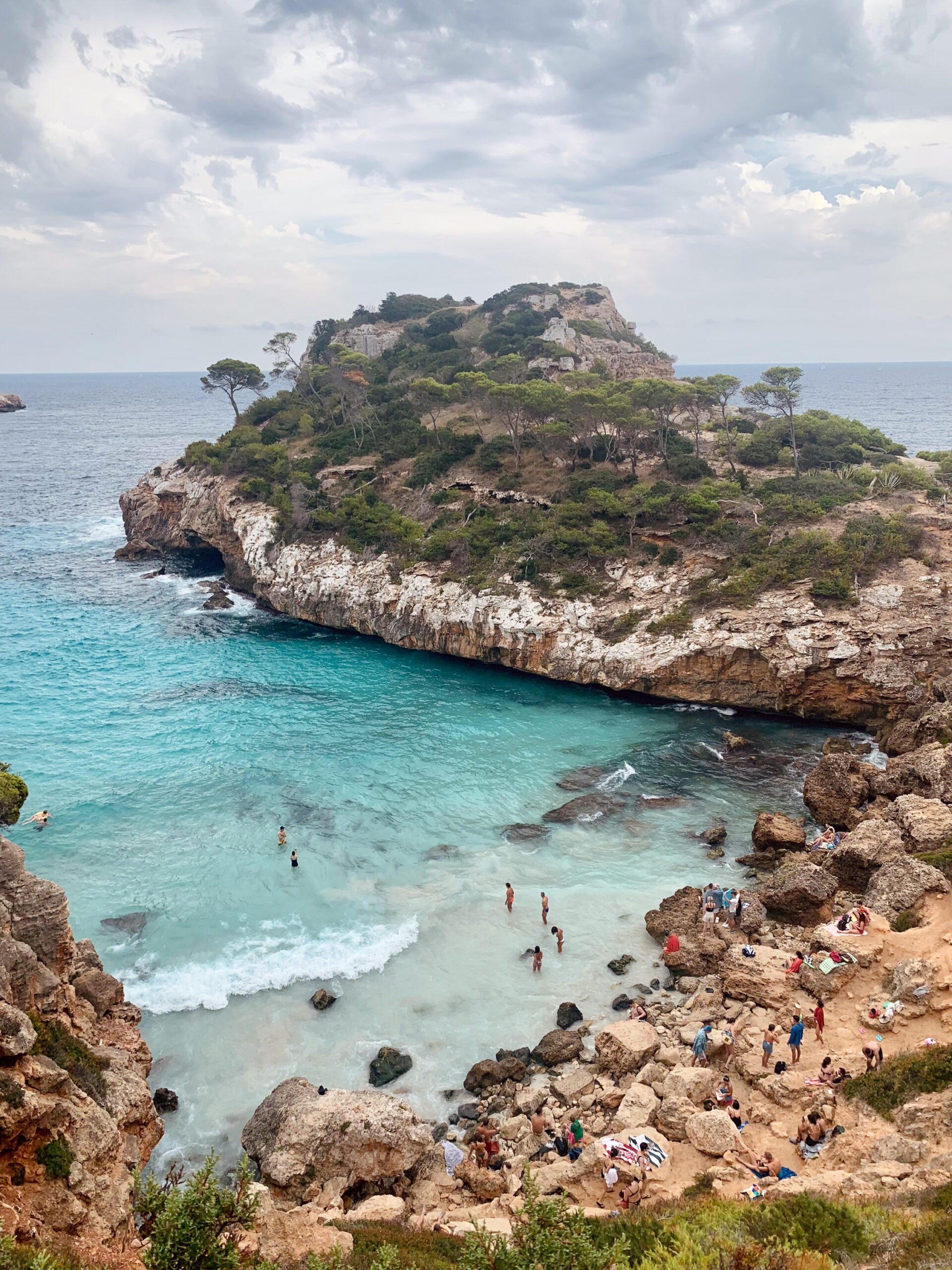
Tagore and Bengali Renaissance
Tagore’s indomitable spirit and relentless dedication to his craft played a vital role in the Bengali Renaissance, a period of cultural rejuvenation and intellectual awakening in Bengal.
Promoting Bengal’s Cultural Renaissance
Tagore championed the cause of Bengal’s cultural revival and actively engaged in promoting indigenous art forms, literature, and education. He believed in the power of cultural regeneration and sought to establish a renaissance that would revive Bengal’s glorious past while embracing modernity.
Revitalizing Bengali Literature
Tagore’s contributions to Bengali literature were instrumental in revitalizing the language and elevating it to new heights. His poetry, prose, and plays infused new life into Bengali, allowing it to emerge as a potent medium of artistic expression. Tagore’s works introduced novel ideas, challenged societal norms, and inspired a generation of writers who carried forth his legacy of literary excellence.
Influence on Bengali Society
Tagore’s ideas and ideals permeated every facet of Bengali society, leaving an indelible imprint on its cultural, social, and political fabric. His emphasis on education, social reform, and national identity appealed to people from all walks of life. Through his writings and activism, Tagore empowered individuals to question prevailing societal norms and strive for a more egalitarian and inclusive society.
Nationalism and Independence Movement
Tagore’s nationalist views and his active involvement in the Indian independence movement played a pivotal role in shaping the nation’s destiny.
Tagore’s Nationalist Views
Tagore’s nationalist ideology was shaped by his deep love for his country and his belief in its inherent cultural richness. He advocated for a balanced and harmonious form of nationalism that celebrated India’s diversity and encouraged dialogue among different communities. His iconic poem “Jana Gana Mana,” which later became the national anthem of India, resonated with the aspirations of the masses and ignited a sense of pride in their motherland.
Impact on Indian Independence Movement
Tagore’s participation in the Indian independence movement extended beyond his poetic expressions of nationalism. He actively supported the Swadeshi movement, which aimed to promote indigenous industries and boycott British products. Tagore’s encouragement and rallying of the masses through his speeches and writings invigorated the movement and became a catalyst for change.
Role in Shaping Indian National Identity
Tagore’s profound contributions to India’s national identity were rooted in his vision of a united and inclusive nation. He believed in the power of education to bridge societal divides and foster a sense of unity among Indians. Tagore’s establishment of Visva-Bharati University, an institution that celebrated Indian culture while embracing global knowledge, served as a beacon of enlightenment and a testament to his vision of a resurgent India.
Education and Social Reform
Tagore’s vision for education and his commitment to social reform serve as a testament to his progressive worldview.
Vision for Education
Tagore envisioned education as a transformative force that could empower individuals and shape society. His educational philosophy emphasized holistic development, nurturing creativity, and fostering a deep connection with nature. He advocated for a decentralized and child-centric approach to education, challenging the traditional rote memorization methods prevalent at the time.
Bolstering Women’s Education
Tagore’s commitment to gender equality extended to his efforts in bolstering women’s education. He recognized the importance of empowering women through education and tirelessly worked to ensure equal access to learning opportunities for women. Tagore’s emphasis on women’s education paved the way for social transformation, enabling women to break free from the shackles of societal norms and contribute to the nation’s progress.
Social Reform Initiatives
Tagore’s commitment to social reform went beyond the realms of education. He ardently championed causes such as widow remarriage, caste system abolition, and the upliftment of marginalized communities. Tagore’s progressive stance on these issues challenged the status quo and catalyzed a broader movement for social justice and equity.
Tagore’s International Influence
Tagore’s immense talent and his ability to transcend cultural boundaries earned him international acclaim and positioned him as a global cultural icon.
Nobel Prize for Literature
In 1913, Tagore became the first non-European Nobel laureate in Literature, a testament to the universal appeal and profound impact of his writings. The Nobel Prize elevated Tagore’s status on the global stage, garnering recognition for his literary brilliance and presenting an opportunity to disseminate his works worldwide.
Interactions with Western Intellectuals
Tagore’s international influence was further amplified through his interactions with Western intellectuals and artists. His visits to Europe and the United States facilitated exchanges of ideas and fostered a cross-cultural dialogue that enriched both Eastern and Western thought. Tagore’s friendships with luminaries such as Albert Einstein, Romain Rolland, and William Butler Yeats showcased the universality of his works and their enduring appeal.
Translation and Global Reach
Tagore’s works have been extensively translated into numerous languages, allowing his poetry, plays, and novels to reach audiences across the globe. The lyrical beauty and profound insights embedded in Tagore’s writings resonate with readers transcending cultural and linguistic boundaries. His profound impact on literature and the arts extends far beyond the confines of India, firmly establishing him as a global luminary.
Impact on Literature and Arts
Tagore’s artistic genius revolutionized not only Bengali literature but also played a pivotal role in shaping modern Indian literature and inspiring Western authors.
Influence on Bengali Literature
Tagore’s contributions to Bengali literature cannot be overstated. His lyrical poetry, eloquent prose, and captivating plays revitalized the Bengali language, infusing it with renewed vigor and setting new standards for literary excellence. Tagore’s experimentation with various literary forms and innovative use of language continue to influence contemporary Bengali writers, who draw inspiration from his rich literary heritage.
Modern Indian Literature
Tagore’s impact on modern Indian literature is immeasurable. His writings resonated with a nation in flux, grappling with its identity and aspiring for cultural and political emancipation. Tagore’s works served as a catalyst for a literary renaissance in India, inspiring subsequent generations of writers to explore themes of national identity, social reform, and individualism.

Inspiring Western Authors
Tagore’s writings and ideas have not only captivated Indian audiences but have also left an indelible impact on Western authors. His universal themes, nuanced characterizations, and lyrical prose have inspired renowned writers such as W.B. Yeats, Ezra Pound, and Robert Frost, who recognized the immense literary prowess of Tagore and sought to imbibe elements of his style and worldview into their own works.
Tagore’s Influence in Music and Performing Arts
Tagore’s contributions to music and the performing arts have had a lasting impact, both within India and beyond its borders.
Rabindra Sangeet and Musical Legacy
Rabindra Sangeet, Tagore’s unique musical style, has become an integral part of Indian culture. His soulful compositions, which seamlessly blend poetry with melodious tunes, continue to be performed and celebrated in India and among Indian diaspora communities worldwide. The emotional depth and universality of his songs transcend language barriers, touching the hearts of people from different cultures.
Theatrical Adaptations
Tagore’s plays have been adapted and performed in various languages and countries, allowing audiences worldwide to experience the timeless brilliance of his storytelling. Whether it is the profound introspection of “The Post Office” or the exploration of complex human emotions in “Chitra,” Tagore’s theatrical works continue to captivate and engage audiences, reinforcing his status as a pioneer of modern Indian theater.
Film and Television
Tagore’s influence extends to the realm of film and television, with his works being adapted into numerous cinematic and televised productions. Directors and actors have brought Tagore’s stories to life on the silver screen, allowing audiences to experience the visual splendor and potent narratives of his works. These adaptations have introduced Tagore’s legacy to a new generation, ensuring the continued relevance of his artistic contributions.
Tagore’s Legacy in Philosophy and Culture
Tagore’s profound philosophical thought and his relentless efforts to expand cultural boundaries have left an enduring legacy.
Tagore’s Philosophical Thought
Tagore’s philosophical thought encompassed a wide array of themes, including spirituality, humanism, and the relationship between nature and humanity. His writings explored the intricacies of the human condition, questioning societal norms and challenging conventional wisdom. Tagore’s philosophy, rooted in a deep reverence for nature and a belief in the inherent goodness of humanity, continues to resonate with individuals seeking meaning and purpose in their lives.
Expanding Cultural Boundaries
Tagore’s relentless efforts to expand cultural boundaries were a testament to his belief in the power of art to bridge divides and foster global understanding. He sought to promote cultural exchange and mutual respect through his travels, interactions with intellectuals, and establishment of institutions like Visva-Bharati University. Tagore’s unwavering commitment to promoting cultural harmony laid the foundation for a worldview that celebrates diversity and transcends nationalistic boundaries.
Tagore’s Universal Message
At the core of Tagore’s work lies a timeless and universal message. His writings and artistic expressions beautifully capture the essence of human emotions, the joys and sorrows of life, and the interconnectedness of all beings. Tagore’s universal message preaches love, compassion, and empathy, reminding us of the common threads that bind humanity together, irrespective of geographic, cultural, or linguistic differences.
Tagore’s Relevance in Contemporary India and Beyond
Tagore’s legacy continues to resonate in contemporary India and holds relevance in a global context.
Influence on Indian Education System
Tagore’s progressive educational philosophy continues to shape India’s education system. His emphasis on holistic development, creative expression, and individuality has found resonance in modern pedagogical approaches. Tagore’s vision of education as a liberating force that cultivates critical thinking and fosters a deep connection with nature remains an inspiration for educational institutions today.
Tagore’s Relevance in a Global Context
Tagore’s visionary ideas and emphasis on cultural exchange and understanding remain highly relevant in a world grappling with complex global challenges. His message of unity, respect for diversity, and the need to transcend cultural and national boundaries is particularly significant in a world that is becoming increasingly interconnected.
Continued Relevance Today
The relevance of Tagore’s work transcends time and continues to inspire individuals across generations. His poetry, music, and ideas fuel the creative spirit and evoke a sense of introspection and wonder. Tagore’s profound impact on literature, music, and social reform ensures that his legacy lives on, serving as a beacon of inspiration for countless individuals seeking meaning, beauty, and a deeper understanding of the world.
Indian Culture Team

Rabindranath Tagore Essay
Rabindranath Tagore was a polymath from India whose knowledge expanded over a wide number of areas including music, literature, art etc. Born in West Bengal on 7 th May 1861, Tagore started writing poetry at an early age of eight. Tagore strongly denounced the British Raj and supported Indian Nationalists. Tagore was critical of Gandhi activism; however, he played a significant role in resolving the dispute between Gandhi and Ambedkar on the dispute over separate electorates for the untouchables.
Long and Short Essay on Rabindranath Tagore in English
We have provided below short and long essay on Rabindranath Tagore in English for your information and knowledge.
These lines have been written in simple and effective English language to make them easily memorable and presentable when needed.
After going through these Rabindranath Tagore essay you will know about the life and achievements of Rabindranath Tagore and his contribution to the Indian freedom struggle.
The essays will be helpful in your school/college events and essay writing or speech giving competitions. Students can select any of the essays given below:
Rabindranath Tagore Essay 1 (100 words)
Rabindranath Tagore was a great Indian poet. He was born on 7 th of May in 1861 at Jorasanka, Kolkata. His parents name was Maharsi Debendranath Tagore (father) and Sarada Devi (mother).
He took his education at home under private teachers for various subjects. He started writing poems in his very early age. He is still a famous poet as he wrote thousands of poems, short stories, songs, essays, dramas, etc. Both, he and his works are famous all around the world. He became the first Indian who received the Nobel Prize in 1913 for his great writing named “Gitanjali”. He was also a philosopher, a painter, and a great patriot who composed our National Anthem titled as, “Jana Gana Mana”.
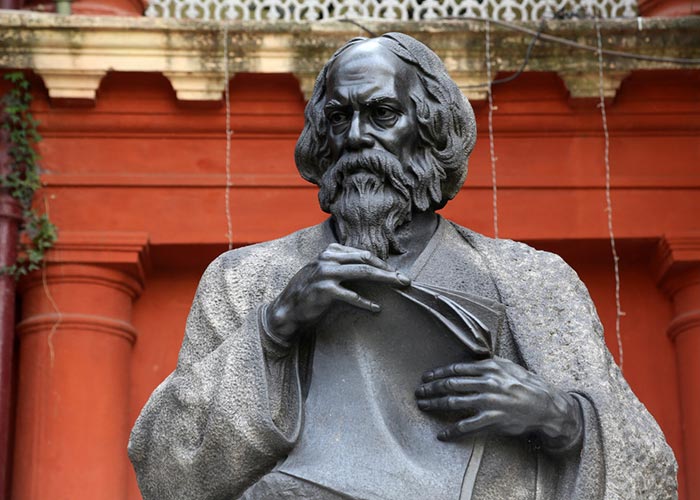
Rabindranath Tagore Essay 2 (150 words)
Rabindranath Tagore was a great poet, patriot, philosopher, humanist, and painter. He was born in Jorasanka, Calcutta on 7 th of May in 1861 in his ancestral home to the Maharsi Debendranath Tagore and Sarada Devi. He was 14 th child of his parents however different from others. He got his proper education and knowledge about various subjects at home by the private teachers. He was very young when started writing poems, some of them were published in the periodicals.
He went to England for his higher education but was not satisfied by the traditional system of education there. He returned to India and opened his own school named Santiniketan in Bolpur, Birbhum, Bengal. This school later became a college and then a university (Visva-Bharati). He was honored with the Nobel Prize for ‘Gitanjali’ in 1913. He was also awarded with Knighthood by the British Crown however he returned as a mark of protest against massacre in Jallianwalabagh.
Rabindranath Tagore Essay 3 (200 words)
Rabindranath Tagore was a great Indian poet and the youngest son of his parents. He was a leader of Brahmo Samaj in nineteenth-century, Bengal. He took his early education at home however higher education in England. He went to England at his seventeen for his formal schooling however could not complete. His interest and close touch with the common humanity draw his attention towards the country to do some social reforms. Then he started a school at Santiniketan where he followed the Upanishadic ideals of education.
He also involved himself in the Indian nationalist movement and followed his own non-sentimental and visionary ways. Gandhi Ji was a devoted friend of him. His immense love towards the country was seen when he returned the honor given by British Government in 1915 as a protest against British policies in the country.
He was a good writer and get success in writing in his native Bengal. His continuous success in writing made him able to become a famous voice of India’s spiritual heritage. Some of his odd volumes of poetry are like Manasi, Sonar Tari, Gitanjali, Gitimalya, Balaka, etc. Besides poetries, he was also famous in writing dance dramas, musical dramas, essays, travel diaries, autobiographies, etc.
Rabindranath Tagore Essay 4 (250 words)
Rabindranath Tagore was also known as Rabindranath Thakur and more popularly as Gurudev. He was a great Indian poet who has given many famous writings to the country. Undoubtedly, he was a greatest poet after Kalidas. Now, he is well known all over the world as a greatest Indian poets and writers of all ages.
He was born in a rich and cultured family in Jorasanko, Kolkata on 7 th of May in 1861 to the Maharshi Debendranath Tagore (father) and Sarada Devi (mother). He lost his mother at his fourteen in 1875. He developed the interest of writing poems in his early age. He was also a painter, a philosopher, a patriot, an educationist, a novelist, a singer, an essayist, a story writer, and a constructive worker.
His great writings in the form of novels and short stories indicate his wisdom, deep experience and understanding about human character. He was a poet who has given a nice national anthem “Jan Gana Mana”. Some of his important works are “Geetanjali”, “Amar Shonar Bangla”, “Ghare-Baire”, “Rabindra Sangeet”, etc. He has been awarded with the Nobel Prize in 1913 for his great English version writing of “Geetanjali”.
He was the first Indian and first Asian to get this award. He was the founder of Vishwabharati University at Santiniketan in 1902. His endless love towards his country and countrymen forced him to reject “Knighthood”, an award given by the British government, in 1919 in a protest against Jallianwala Bagh massacre. His great writings still inspire and encourage people of the country.
Rabindranath Tagore Essay 5 (300 words)
Rabindranath Tagore was a famous Indian poet who popularly known as Gurudev. He was born in Kolkata on 7 th of May in 1861 in a rich and cultural family. His parents were Maharishi Debendranath (father) and Sharda Devi (mother). He was very much interested in writing poem from his childhood. Together with being a great poet, he was also a humanist, patriot, painter, novelist, story-writer, educationist and philosopher. He was a cultural ambassador for the country who spread the knowledge of Indian culture all around the world. He was a talented and genius child of his time who did great works. He was like a rising sun in the field of poem writing.
He had shown well the mental and moral spirit of the people through his writings in poem or stories forms. His writings have also been proved to be path-breaking and revolutionary even for today’s people. He was full of sorrow because of the massacre tragedy at Jalianwala Bagh in which many innocent people including women and children were killed on 13 th of April in 1919 at Amritsar by the General Dyer and his soldiers.
He was a great poet however a patriot too who always believed in oneness of life and its expression. Through his writings, he tried his best to bring people much closer to unite them in order to maintain the love, peace, and brotherhood. He had described well about love and harmony through his poetry and stories. His whole life also provides the clear view of love and harmony to each other. His devotion towards his country is shown by the following statement, “My country that is forever India, the country of my forefathers, the country of my children, my country has given me life and strength.” And again, “I shall be born in India again.
Rabindranath Tagore Essay 6 (400 words)
Rabindranath Tagore, a great Indian poet, was born on 7 th of May in 1861 at Calcutta, India to Debendranath Tagore and Sarada Devi. He was born in a rich and cultural Brahmin family. He took his early education at home under private teachers and never attended school however went to England for higher studies. He started writing poems at his early age of eight. His poetry was published under the pseudonym Bhanushingho (Sun Lion) when he was just sixteen. He went to England in 1878 to study law however returned India before completing to pursue the career as a poet and writer.
He translated his work Geetanjali into English during the long sea journey to England. He was awarded with the Nobel Prize for literature within the year his Geetanjali was published. He has mentioned the mysticism and sentimental beauty of Indian culture in his writing for which a non-westerner was honored with prestigious award first time. Together with being a renowned poet, he was also a genius, writer, novelist, visual artist, composer, playwright, and a philosopher. He knew well how to command over language while writing poem or stories. He was a good philosopher through which he influenced a huge range of Indian people during the freedom struggle.
His contribution towards the Indian literature is very vast and unforgettable. Two of the songs from his Rabindrasangeet are more famous as they have been national anthem of two countries such as “Amar Shonary Bangla” (national anthem of Bangladesh) and “Jana Gana Mana” (national anthem of India). His creative writings, whether in the form of poem or stories, are unchallenged even today. Perhaps he was the first who bridge the gap between west and east through his effective writings.
Another composition of him was Puravi in which he mentioned Evening Songs and Morning Songs under many subjects like social, moral, cultural, religious, political, etc. Manasi was written by him in 1890 in which he collected some social and poetical poems. Most of his writings were based on the life of people of Bengal. Another writing named Galpaguccha was a collection of stories based on the poverty, backwardness, and illiteracy of the Indian people.
Other poetry collections are like Sonar Tari, Kalpana, Chitra, Naivedya, etc and novels are like Gora, Chitrangda and Malini, Binodini and Nauka Dubai, Raja and Rani, etc. He was very religious and spiritual man which helped him a lot in the days of crisis. He was a great educationist thus he founded an abode of peace, a unique university named Santiniketan. He died on 7 th of August in 1941 in Kolkata before seeing the India’s independence.
More Information:
Essay on Sarvepalli Radhakrishnan
Essay on Sri Aurobindo
Essay on Sardar Vallabh Bhai Patel
Essay on Ishwar Chandra Vidyasagar
Related Posts
Money essay, music essay, importance of education essay, education essay, newspaper essay, my hobby essay, leave a comment cancel reply.
Your email address will not be published. Required fields are marked *
- School Guide
- English Grammar Free Course
- English Grammar Tutorial
- Parts of Speech
- Figure of Speech
- Tenses Chart
- Essay Writing
- Email Writing
- NCERT English Solutions
- English Difference Between
- SSC CGL English Syllabus
- SBI PO English Syllabus
- SBI Clerk English Syllabus
- IBPS PO English Syllabus
- IBPS CLERK English Syllabus
Rabindranath Tagore Essay in English For Students
- Pandit Jawaharlal Nehru Essay in English For Students
- 500+ Words Essay on Swami Vivekananda in English for Students
- Essay on India of My Dreams For Students
- 500+ Words Essay on Mahatma Gandhi in English
- My Aim in Life Essay For Students: 100, 200 & 500 Words Essay
- English Essay Writing Tips, Examples, Format
- Discuss the Major reasons for Poverty in India
- APJ Abdul Kalam Essay For Students: Samples 100 to 500 Words
- Essay on My Favourite Book For Students
- The Agenda for a National Education - Class 8 Notes
- 500+ Words Essay on Importance of Education in English
- Essay on Science in English: Check 200, 300 & 500 Words Essay
- Essay on My Father in English: 300, 500 & 800 Words Essay
- 40+ Inspirational Quotes for Students for Motivation
- NCERT Solutions for Class 9 English Moments Chapter 6 Weathering the Storm in Ersama
- Republic Day Speech 2024 in English: Short and Long Speech for Students
- NCERT Solutions for Class 9 English
- A Guide to Writing an Essay for Job Interviews
- Most Important Questions on Indian Dance forms
Rabindranath Tagore was one of the greatest minds India has ever produced. He was a talented writer, poet, philosopher, artist and so much more. Tagore’s amazing work influenced literature, art, education and even politics during his time. Born in 1861 into a rich Bengali family, Tagore showed his genius from a very young age. He wrote his first poetry book at just 16 years old! His books, plays, songs and essays covered so many areas of life. In this article, we’ll explore the incredible life and works of the multitalented Rabindranath Tagore.
Get ready to learn about one of the brightest scholars and creative thinkers the world has ever seen. Tagore’s wisdom and creativity will truly inspire you.
10 Lines on Rabindranath Tagore Essay
Here are 10 lines that can help you write a Rabindranath Tagore Essay:
- Rabindranath Tagore, born on May 7, 1861, in Calcutta, was a multifaceted genius revered as the Bard of Bengal.
- Tagore was the first non-European to win the Nobel Prize in Literature in 1913 for his collection of poems, “Gitanjali.”
- He was a poet, playwright, novelist, philosopher, musician, and artist, contributing significantly to Bengali literature and Indian culture.
- Tagore’s literary works reflect themes of universalism, humanism, and spirituality, transcending cultural and linguistic boundaries.
- He founded Shantiniketan, an educational institution that later became Visva-Bharati University, promoting the concept of holistic education.
- Tagore’s compositions include the national anthems of both India, “Jana Gana Mana,” and Bangladesh, “Amar Shonar Bangla.”
- His notable works include novels like “Gora” and “Ghare-Baire,” and songs such as “Ekla Chalo Re” and “Amar Sonar Bangla.”
- Tagore’s influence extends beyond literature; he was also a social reformer, advocating for women’s rights, education, and rural development.
- His legacy continues to inspire generations, with his thoughts on education, nationalism, and spirituality remaining relevant to contemporary discourse.
- Rabindranath Tagore’s contributions have left an indelible mark on Indian literature and culture, making him a revered figure not only in India but across the world.
800+ Word Essay on Rabindranath Tagore
Rabindranath Tagore was a multi-talented literary genius who reshaped the cultural landscape of Bengal and India in the late 19th and early 20th centuries. He was a poet, novelist, playwright, composer, philosopher, social reformer, and painter – a true Renaissance man whose works spanned multiple genres and disciplines. Tagore’s profound impact on the literary and artistic traditions of his time earned him the sobriquet “Kabiguru” (Poet Laureate) in Bengal, and his immense contribution to the freedom movement in India cemented his status as a pivotal figure in the nation’s cultural and political renaissance.
Born in 1861 into a wealthy and illustrious Brahmin family in Calcutta, Tagore was exposed to a diverse array of intellectual and artistic influences from a young age. His father, Debendranath Tagore, was a leading philosopher and religious reformer, while his brothers and cousins were pioneers in various fields, including literature, art, and science. This stimulating environment nurtured Tagore’s inherent literary talents and fueled his insatiable curiosity about the world around him. Tagore’s literary prowess was evident from an early age, and he began writing poetry at the tender age of eight. His first collection of poems, titled “Kabi Kahini” (Poet’s Crazy Tales), was published when he was just sixteen years old. As he matured as a writer, Tagore’s poetry evolved to encompass themes of nature, spirituality, love, and the human condition, reflecting his deep philosophical musings and his reverence for the natural world.
One of Tagore’s most celebrated works is the collection of poems titled “Gitanjali” (Song Offerings), which earned him the prestigious Nobel Prize in Literature in 1913, making him the first non-European to receive this honor. The profound depth and lyrical beauty of “Gitanjali” captivated readers worldwide, cementing Tagore’s reputation as a literary giant on the global stage.
Beyond his poetic genius, Tagore’s literary output encompassed a vast array of genres, including novels, short stories, plays, essays, and memoirs. His novels, such as “Gora” and “Ghare Baire” (The Home and the World), explored complex social and political themes, shedding light on the struggles and contradictions of modern Indian society. His plays, including “Raja” (The King of the Dark Chamber) and “Raktakarabi” (Red Oleanders), combined elements of classical Indian theater with contemporary themes and innovative staging techniques.
Tagore’s artistic talents extended beyond literature, as he was also a prolific composer and painter. His songs, known as “Rabindra Sangeet,” fused traditional Indian melodies with poetic lyrics, creating a unique musical genre that continues to captivate audiences today. His paintings, characterized by bold colors and fluid lines, captured the essence of his literary works and reflected his deep connection with nature. Beyond his artistic achievements, Tagore was a tireless advocate for social reform and education. He established Visva-Bharati University in Santiniketan, West Bengal, which became a center for cultural revival and education rooted in traditional Indian values. Tagore’s educational philosophy emphasized the holistic development of the individual, combining academic learning with artistic expression and a deep appreciation for nature.
Tagore’s involvement in the Indian independence movement was also significant. While he initially held a nuanced view of British imperialism, his disillusionment with colonial policies and his desire for self-governance for India grew stronger over time. His novel “Ghare Baire” and his essay “Swadeshi Samaj” (The Movement for Self-Reliance) became powerful rallying cries for the freedom struggle, inspiring countless Indians to join the fight for independence.
Tagore’s legacy extends far beyond the boundaries of India, as his works have been translated into numerous languages and continue to resonate with readers and scholars around the world. His vision of a harmonious coexistence between diverse cultures and his advocacy for universal human values have made him a revered figure in the global literary canon.
In his later years, Tagore embarked on several international tours, spreading his message of peace, harmony, and cross-cultural understanding. His lectures, poetry readings, and interactions with luminaries such as Albert Einstein and Ezra Pound further solidified his reputation as a global cultural ambassador.
Today, Rabindranath Tagore’s influence can be seen in various facets of Indian culture, from literature and music to education and social reform. His works continue to inspire generations of artists, writers, and thinkers, while his life and philosophy serve as a beacon of hope and inspiration for those striving to create a more just and harmonious world. Tagore’s words, “The butterfly counts not months but moments, and has time enough,” encapsulate his appreciation for the beauty and fleeting nature of life. Through his prolific and multifaceted body of work, Rabindranath Tagore has indeed transcended the bounds of time, leaving an indelible mark on the cultural tapestry of India and the world at large.
Similar Read Holi Essay 2024 for Students in English: Short Essay on Holi Essay on My Family: Short, 10 Lines, 100 Words Essay 500+ Words Essay on Swami Vivekananda in English for Students 500+ Words Essay on Mother Teresa in English For Students APJ Abdul Kalam Essay For Students: Check 500 Words Essay
Rabindranath Tagore Essay- FAQs
Who was rabindranath tagore.
Rabindranath Tagore was a renowned Indian poet, writer, musician, and artist who lived during the late 19th and early 20th centuries. He was the first non-European to win the Nobel Prize in Literature in 1913.
What are some of Rabindranath Tagore’s famous works?
Tagore’s famous works include “Gitanjali,” a collection of poems for which he won the Nobel Prize, as well as “Kabuliwala,” “The Home and the World,” and “The Post Office,” among others.
What was Rabindranath Tagore’s philosophy?
Tagore believed in the universality of humanity and preached the importance of love, harmony, and spiritual freedom. He emphasized the need for education that nurtures creativity and individuality.
How did Rabindranath Tagore contribute to Indian literature and culture?
Tagore’s contributions to Indian literature and culture are immense. He rejuvenated Bengali literature and music, established the Visva-Bharati University, and played a crucial role in India’s struggle for independence through his writings.
What was Rabindranath Tagore’s role in education?
Tagore founded the Visva-Bharati University in Santiniketan, West Bengal, with the vision of providing an education that harmonizes the best of Indian and Western traditions. His educational philosophy emphasized creativity, freedom, and holistic development.
How did Rabindranath Tagore influence Indian nationalism?
Tagore’s writings inspired the Indian nationalist movement with his vision of a united India based on pluralism and mutual respect. His songs, such as “Jana Gana Mana,” became rallying cries for freedom fighters.
What is Rabindranath Tagore’s legacy?
Tagore’s legacy extends beyond literature and includes his contributions to art, music, and social reform. He remains an influential figure in India and beyond, revered for his timeless wisdom and humanitarian ideals.
Please Login to comment...
Similar reads.
- English Blogs
- School English
Improve your Coding Skills with Practice
What kind of Experience do you want to share?
India Votes 2024

These innovations have made Amrik Sukhdev Dhaba in Murthal the truck drivers’ favourite since 1967

Sanjay Subrahmanyam: Donald Trump, the American Pied Piper

Why even those who don’t believe in deities love bhakti poetry

Thriller: A serial killer is on the loose, murdering India’s famous nuclear scientists one by one

In Saudi Arabia’s scaled-down plans for megacity across the desert – a warning sign for the future

The Man, the Machine: Merab Dvalishvili in Mumbai

Why some Kashmiris who spurned ballot in the past may vote in this Lok Sabha election

‘Maharajas, Emperors, Viceroys, Borders’: Breaking down the histories of Nepal-India border disputes

Suspended Congress leader from Surat resurfaces after 20 days, alleges party betrayed him

Lok Sabha polls top updates: I will not have to go back to jail if voters choose AAP, says Kejriwal
What were Rabindranath Tagore’s views on the proposal of a memorial at the Jallianwala Bagh?
An excerpt from ‘the jallianwala bagh journals’, by sarmistha dutta gupta..

When I had begun researching on Jallianwala Bagh, I had no knowledge of Rabindranath Tagore’s views on the idea of a memorial at the Bagh when it was first proposed in 1920. After returning from Amritsar in 2016, many unknown and little-talked-about aspects of the massacre started revealing themselves to me in the course of my work. I learnt that the poet's written message, sent through his friend CF Andrews (1871-1940) for the Bombay session of the Congress in April 1920 and read out by MA Jinnah (1876-1948) who was until then a prominent member of the Congress, clearly stated that the greed for power and clash between nation-states that resulted in the unprecedented First World War, had given rise to gross injustices like the Jallianwala Bagh. It also said that a memorial at the Bagh that would keep alive the black memory of anger was not desirable. In the same year, Tagore elaborated on this in the journal Santiniketan , saying, “It is not a matter of pride for us to commemorate this event in the Punjab … Our rulers have erected memorials of their crimes in Kanpur and Calcutta. Should we imitate them? Wouldn’t such an attempt be our defeat?”
We know that the Kanpur Memorial Garden was built a few years after 125 unarmed English women and children were murdered in the Bibi Ghar during the 1857 Revolt or the First War of Independence. At Viceroy Lord Canning’s initiative, a sculpture was erected at the spot of the well where the lifeless bodies were dumped. Several other such memorials were also built around that time in Lucknow, Kolkata, and other places. The poet opposed the construction of any such memorial of the Jallianwala Bagh Massacre, imitating the imperialist rulers. Our history has practically overlooked this profound anti-colonial stand, and Tagore’s disagreement with Gandhi and the Congress over the memorial at the Bagh has been almost erased.
The poet was opposed to the idea of monumentalising memory and not to the idea of remembering per se. Someone who had composed so many songs and poetry on memory and remembrance could not have been uninterested in reminiscence. In Santiniketan, on the passing of someone who had been a part of the Visva-Bharati community locally or internationally, people would sit together and share memories of the departed. There would be alpana (decorative floor designs typical of South Asia, especially West Bengal in India, and Bangladesh) drawn at the site of such memorial gatherings but the alpana pattern would differ from what was drawn during other festive occasions in Santiniketan. The news bulletins and journals published by Visva-Bharati would carry reports and memory pieces read out at the memorials. But there was never a tradition of erecting busts or any kind of structures to perpetuate memories of those revered and loved. This was completely different from the concept of building memorial parks and memorial columns. For the poet, influencing our collective thinking against war, aggressive nationalism, and all kinds of violence was much more important than supporting the idea of a memorial garden, in imitation of the colonisers, at Jallianwala Bagh.
In response to Tagore's statement at the time, Gandhi wrote:
What Sir Rabindranath Tagore has said is perfectly true, that we shall certainly not advance by keeping alive the memory of General Dyer’s cruelty. To perpetuate the memory of truth, firmness, courage and innocence, wherever these may be found – that is the people’s real duty and in doing so lies the nation’s regeneration.
Gandhi had felt that the memorial would awaken a sense of truth, honesty, courage, and simplicity in the minds of people instead of cultivating hatred and revenge. The memory of those unarmed, innocent people falling prematurely on the ground of the Jallianwala Bagh will be made permanent. In 1920, colonised citizens generously donated to claim the place off the hands of the colonial rulers, so that the evidence of genocide would not be erased. The bullet-riddled wall may still be there as evidence but in post-1947 India, especially over the last 50 years, the site has simply become a shrine of remembrance owned by the State, completely disconnected from family and community memories of the Bagh and narratives about colonial oppression and peoples’ resistance to it in Punjab.
Was our visionary poet able to see that someday, when the memorial at Jallianwala Bagh would pride itself on being a high-profile structure with a huge footfall, the nation-state would ensure that there is no possibility of any “agony of indignation” getting aroused in the hearts of its visitors to authoritarianism and terror?
Had the poet been around today, I believe he would have taken a keen interest in the many post-colonial museums of memories initiated by individuals and collectives in different parts of the world which make visible narratives of colonial, racial, and nationalistic hostility and tyranny. Memory-making with marginalised voices and a greater participation of local interests have taken place, for instance, in New Zealand and Australia with the Maori people co-creating memorial spaces and helping us question statist versions of history. The Memorial for Peace and Justice in Alabama, US, is another such citizens’ initiative that makes us aware of centuries of sanctioned violence and unrecorded crimes against enslaved Black people. The museum has partnered with sculptors, painters, singers, and writers to innovatively conceive a site where people can gather and reflect on America’s history of racial inequality and terror. It documents thousands of racial lynchings in 12 states of the US and has memorialised this history by visiting hundreds of lynching sites, collecting soil, and erecting public signposts, in an effort to reshape the predominantly White cultural landscape. The civil rights movements and contemporary issues of police violence and racially biased criminal justice system are woven in through artistic interventions in the memorial. Thus, it ceases to be a static monument, encourages us to question statist representations of histories, and talk about oppression and injustice both then and now.

Paragraph on Rabindranath Tagore [100, 150, 200, 250 Words]
Paragraph on Rabindranath Tagore: Rabindranath Tagore is one of the greatest poets in the world. In this article, you are going to learn how to write a paragraph on Rabindranath Tagore in English. Here, we’ve provided 4 paragraphs on Rabindranath Tagore (100, 150, 200, and 250 words). These paragraphs will be very helpful for students of all classes (class 1 to class 12). So, let’s begin.
Table of Contents
Paragraph on Rabindranath Tagore [100 Words]
Rabindranath Tagore was a great Indian poet. He was born at Jorasanka, Kolkata on 7th May 1861. His father’s name was Devendranath Tagore . His mother’s name was Sarala Devi. He started writing poems from his childhood. Rabindranath wrote many poems, short stories, essays, dramas, novels and songs.
He was also a great composer. He composed the national anthem of our county, Jana Gana Mana . His Important works are Gitanjali, Ghare Baire, Rabindra Sangeet, Amar Sonar Bangla, etc. He was the first Indian to win the noble prize in 1913 for ‘Gitanjali’. He died on 7th august 1941. Rabindranath tagore will remain in our hearts forever.
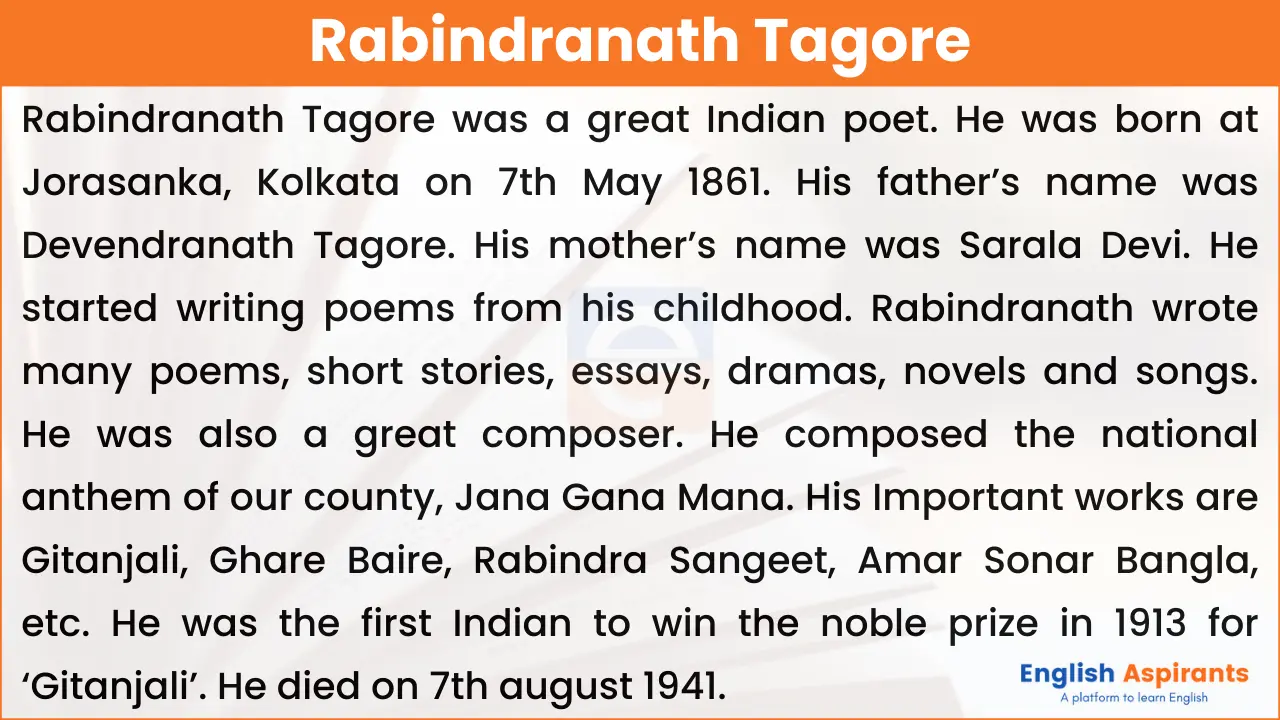
Paragraph on Rabindranath Tagore [150 Words]
Rabindranath Tagore, one of the greatest sons of India, was born in a very rich, cultured and zamindar family at Jorasanko, Calcutta, in 1861. His father’s name was Maharshi Devendranath Tagore. He went to England several times in his early childhood.
Tagore showed great promise as a writer and composer from his early childhood. His first opera Bhanu Singher Padabali created a sensation. He was married to Mrinalini Devi . Rabindranath wrote a large number of dramas, novels, short stories, poems, etc. His most brilliant work was Geetanjali for which he was awarded the Nobel Prize for literature in 1913.
However, his greatest creation was Santiniketan . Rabindranath was not only a great writer and composer but also a strong supporter of the nationalist movement. He also worked for international brotherhood and advocated equality among mankind. He died at the age of 80 in 1941.
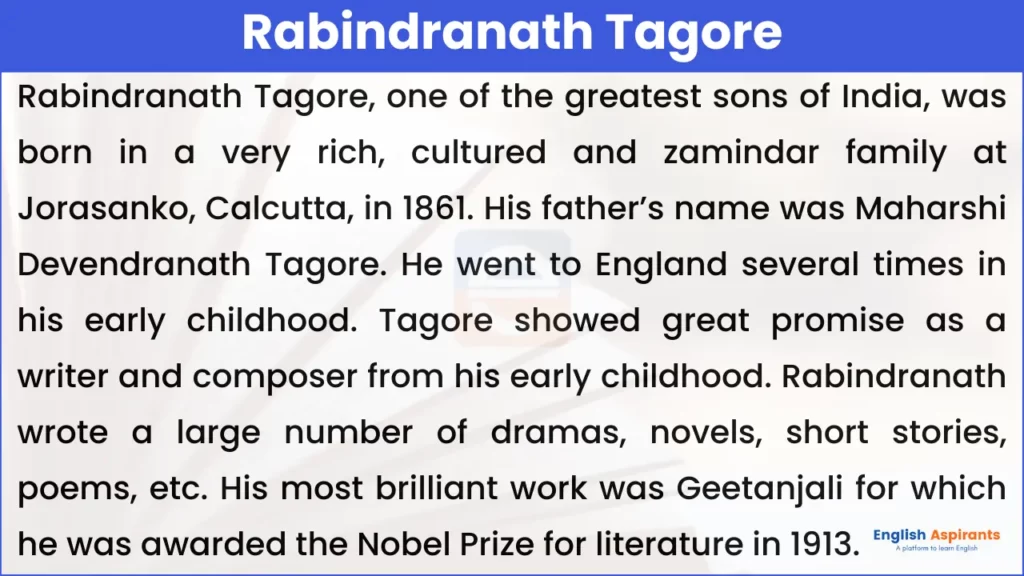
Also Read: Paragraph on Swami Vivekananda
Paragraph on Rabindranath Tagore [200 Words]
Nothing can be said enough for Rabindranath’s genius. Rabindranath Tagore popularly known as Gurudev was born in a rich aristocratic Bengali family in 1861. His father’s name was Debendranath Tagore and his mother’s name was Sarada Devi. Rabindranath was the youngest member of his family.
Rabindranath had no formal University education. But he went to England at the age of 17. He joined the University of London but he returned home soon after. His poetic career started quite early. His first collection of lyrics ‘Manashi’ was published in 1890. That was followed by two more collections of lyrics- ‘Chitra’ and ‘sonar Tari’ .
‘Gitanjali’ was published in 1909. That won for him the Nobel Prize of Literature in 1913. Rabindranath was a versatile literary master. He was a novelist and dramatist of repute. Rabindranath wrote innumerable poems, Dramas, essays, plays, short stories, novels etc. He was a sincere educator and social reformer.
He founded Viswa-Bharati University at Santiniketan, Bolepur in 1901. As a man Rabindranath was outstanding. He was a great patriot and peace-lover. Rabindranath wrote our national anthem, Jana Gana Mana. He ever stood against social wrongs. The great poet passed away on August 7, 1941.
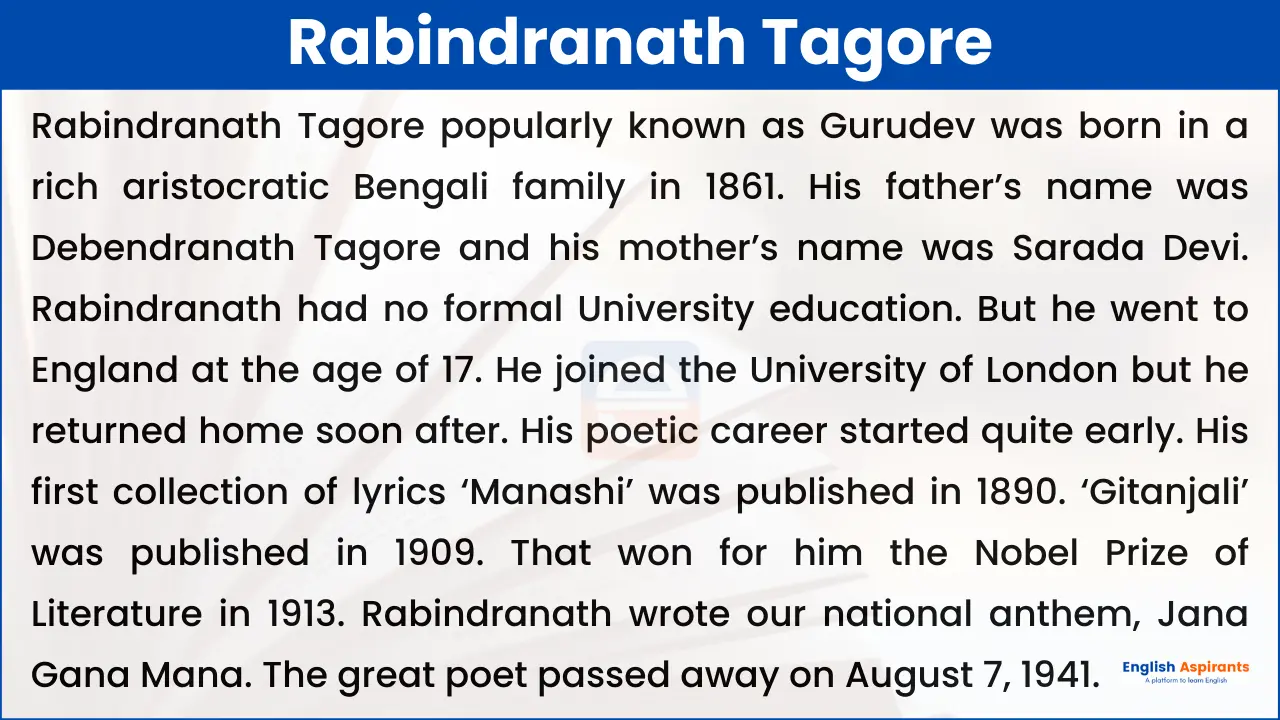
Also Read: Paragraph on Mother Teresa
Rabindranath Tagore Paragraph [250 Words]
Rabindranath Tagore was a great Indian poet. He was lovingly called Gurudev or Kabi Guru . He was born at Jorasanka, Kolkata on 7th May 1861. His father was Devendranath Tagore and his mother was Sarada Devi. He was born in a rich Brahmin family in Kolkata. He was the youngest sibling in his family.
Rabindranath was educated at home. At the age of seventeen, he was sent to England to become a barrister to fulfill his father’s wish. He was interested in writing poems from his childhood. His first poem was published when he was only eight. He started publishing his poems under the pseudonym Bhanusingha .
Tagore was a multi-talented personality with a great desire to learn new things. He was a novelist, essayist, playwright, short-story writer, painter and song composer. Rabindranath Tagore wrote ‘Jana Mana Gana’, which was adopted as the National Anthem of India. His notable works are Gitanjali, Chokher bali, Ghare Baire, Kabuliwallah, Rabindra sangeet, Amar Sonar bangla etc.
He was the first Indian to win the noble prize in literature in 1913 for ‘Gitanjali’. He was married to Mrinalini Devi. Rabindranath Tagore found Visva Bharati University at Shantiniketan, Birbhum. Tagore was also a great patriot, he participated in the Indian nationalist movement.
Tagore was awarded Knighthood by the ruling British Government in 1915. But he renounced his Knighthood as a protest against the Jallianwala Bagh massacre in 1919. This eminent person died at the age of 80 on 7th august 1941. He will remain in our loving memory forever.
Frequently Asked Questions (FAQs)
Q. where was rabindranath tagore born.
Rabindranath was born on May 7, 1861 in a wealthy Brahmin family in Calcutta.
Q. Why Tagore was awarded Noble Prize?
He won the Nobel Prize for his collection of poems, Gitanjali, in 1913
Q. Why did Rabindranath give up his Knighthood?
Rabindranath Tagore gave up his knighthood as a protest against the Jallianwala Bagh massacre in 1919 .
Q. What are the famous books of Rabindranath Tagore?
His famous books are Chokher Bali, Kabuliwallah, Ghare Baire, Gora, The Post Office, Gitanjali, The Astronomer, etc.
Read More Paragraphs: 1. Paragraph on Mother Teresa 2. Paragraph on APJ Abdul Kalam 3. Paragraph on Swami Vivekananda
Related Posts
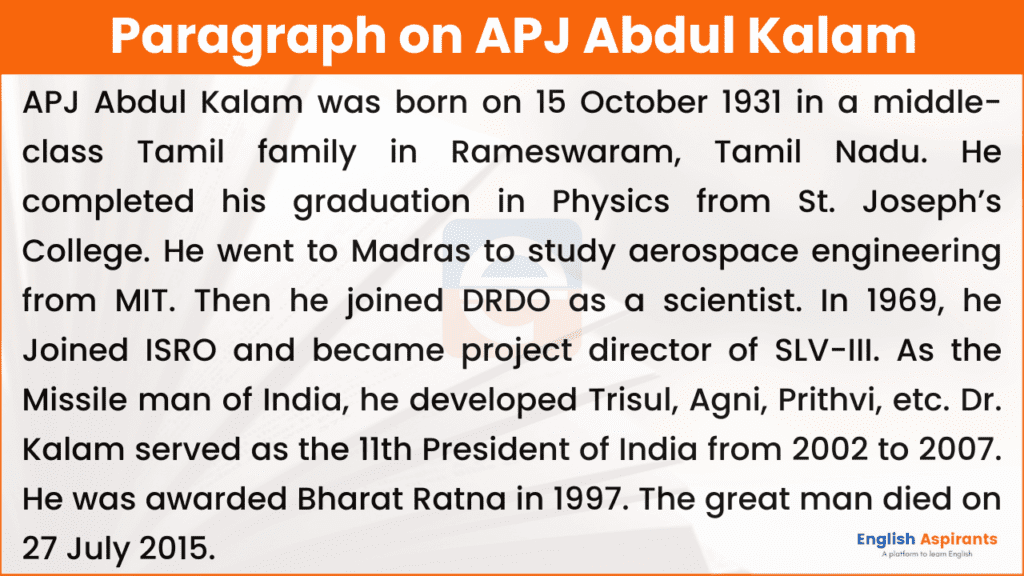
Paragraph on APJ Abdul Kalam [100, 150, 200, 250 Words]

Paragraph on My Family in English [100, 150, 200, 250 Words]

Paragraph on My Likes and Dislikes | 100, 200, 400 Words
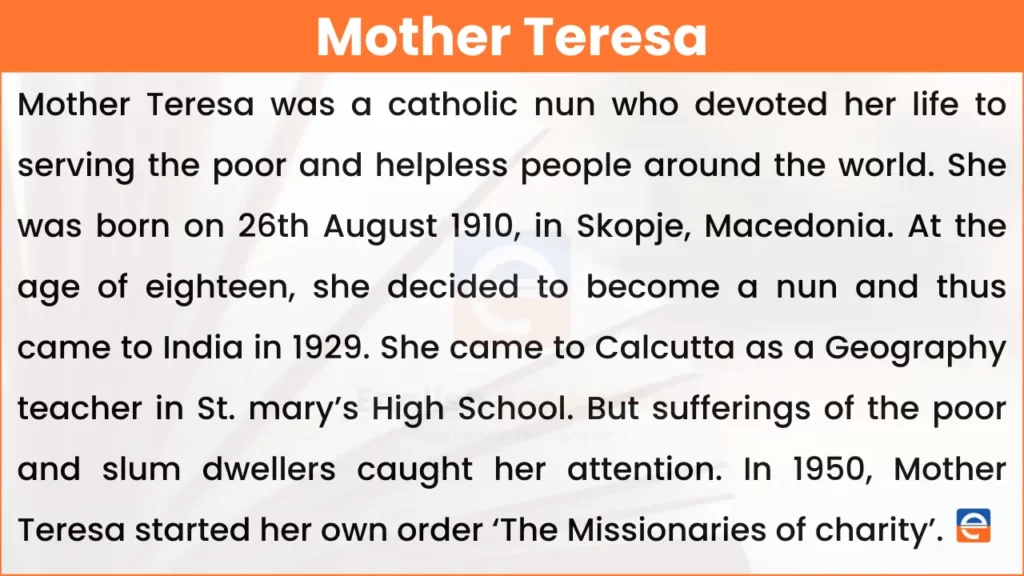
Paragraph on Mother Teresa in English [100, 150, 200 Words]
7 thoughts on “paragraph on rabindranath tagore [100, 150, 200, 250 words]”.
I really like this. I wanna give it 100/10000
Very best writer of english
I really enjoyed reading your blog post on Rabindranath Tagore. His work is so inspiring and I can’t help but be drawn in by his words. Thank you for sharing your thoughts on him!
the website is awesome
In the paragraph of 250 words, I think it should be Sarada Devi not Sarala Devi. Otherwise, this website is awesome….
Thank You so much. Keep visiting our website
Awesome article.
Leave a Comment Cancel Reply
Your email address will not be published. Required fields are marked *
Save my name, email, and website in this browser for the next time I comment.
You are using an outdated browser. Please upgrade your browser to improve your experience and security.
Sunday, 12 May 2024

Agenda - The Sunday magazine
- Cover Story
Reimagining Tagore's educational philosophy
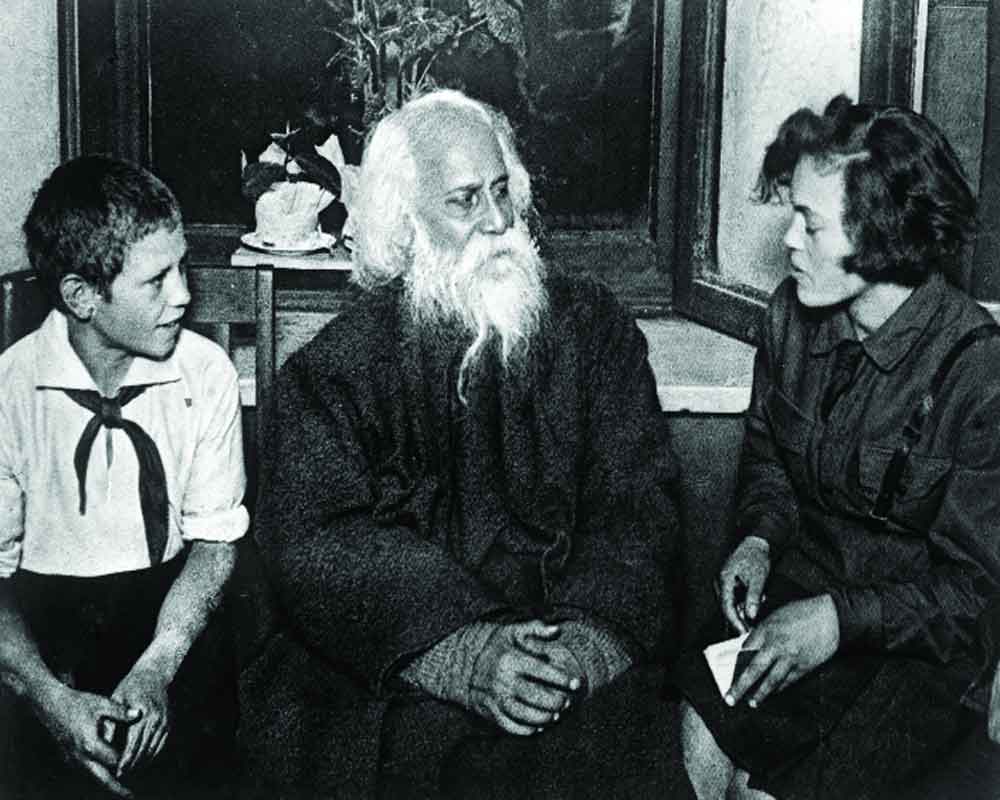
Rabindranath Tagore, the polymathic Nobel Laureate from Bengal, is celebrated not only for his literary brilliance but also for his visionary ideas on education
Rabindranath Tagore (May 7, 1861 to August 7, 1941), the polymathic Nobel Laureate from Bengal, is renowned not only for his literary brilliance but also for his progressive ideas on education. His philosophy of education, rooted in the principles of creativity, freedom, and humanism, continues to resonate with contemporary educational discourse. In today's rapidly changing world, where traditional educational paradigms are being challenged and redefined, Tagore's insights offer valuable perspectives for reimagining education in a manner that fosters holistic development and meaningful engagement with the world.
At the heart of Tagore's educational philosophy is the belief in the innate creativity and potential of every individual. He envisioned education as a process of nurturing this inherent creativity rather than imposing predetermined knowledge. In his seminal work, "Siksha: Herok Ek Jibon" (Education: A Continuum of Life), Tagore emphasized the importance of cultivating curiosity, imagination, and critical thinking skills in learners. He advocated for an education system that encourages students to explore, question, and construct their understanding of the world, rather than passively receiving information.
Further, central to Tagore's philosophy of education is the concept of "Shantiniketan," or the abode of peace - and later Sriniketan - which he established as an experimental educational institution in rural Bengal. Shantiniketan epitomized Tagore's holistic educational philosophy, integrating intellectual, artistic, and spiritual facets of human life. Education transcended traditional confines, embracing nature, arts, and community involvement. Tagore emphasized fostering reverence for nature, aesthetic sensibility, and interconnectedness with all life. He advocated for intellectual development through imagination, free thought, and perpetual curiosity. This personalized approach prioritized holistic growth, including physical development through exercises, yoga, and sports, echoing Tagore's belief: "The highest education is that which does not merely give us information but makes our life in harmony with all existence."
According to Gurudev Rabindranath Tagore, "A teacher can never truly teach, unless he is still learning himself. A lamp can never light another lamp, unless it continues to burn its own flame". In his essay 'Ashramer Shiksha' (Ashram's Teaching), Tagore extolled the virtues of patience in teaching, advocating that only those imbued with affection for their students deserve the mantle of a teacher. He rejected authoritarian teaching methods, viewing them as indicative of governance inadequacy. K M O'Connell (University of Toronto, Canada) had written that Rabindranath Tagore stands with the pioneering educators, like, Rousseau, Pestalozzi, Froebel, Montessori, and Dewey Malcolm Knowles, who have striven to create non-authoritarian learning systems appropriate to the surroundings.
Furthermore, Tagore's educational philosophy emphasizes fostering a love for humanity and advancing universal brotherhood through recognizing the interconnectedness of all beings and promoting empathy across cultures. Central to his approach is establishing harmony between individuals, nature, and the divine. Tagore advocates for freedom in education to unlock individuals' inherent potential and stresses the significance of moral and spiritual development alongside academic learning. His vision aims at cultivating well-rounded individuals capable of selfless service and social integration, ultimately contributing to a conscientious and harmonious society.
In today's context, characterized by rapid technological advancements, globalization, and environmental challenges, Tagore's emphasis on holistic education is more relevant than ever. The prevailing thought on standardized testing and rote memorization (read learning) often stifles creativity and critical thinking, leaving students ill-prepared for the complexities of the modern world. Tagore's philosophy, instead, calls for a shift towards a more student-centered, inquiry-based approach to learning that empowers learners to navigate uncertainty, think critically, and adapt to change.
Tagore's educational philosophy, as elucidated in his essay "The Centre of Indian Culture," emphasizes the imperative for education to reflect and engage with the socio-cultural milieu in which it operates, asserting that genuine education must be attuned to its contextual realities to foster healthy growth.
This sentiment resonates in Sunil Banga's (Lancaster University Management School) analysis - in his paper "The global relevance of Tagore's cosmopolitan educational philosophy for social justice in a post-Westphalian world" published in Journal of Philosophy of Education (August 2023, Oxford) - which underscores Tagore's cosmopolitan approach to education as a potent instrument for social justice and equity in today's world. Banga highlights Tagore's commitment to societal transformation through education, evident in his advocacy for women's empowerment, condemnation of oppression, and advocacy for India's independence (read freedom). Despite emerging from the colonial era, Tagore's philosophy remains pertinent, particularly his emphasis on education as a catalyst for moral and social development, aiming towards societal harmony and integration to address contemporary global challenges.
Moreover, Tagore's emphasis on the integration of arts, music, and literature into the curriculum offers a counterbalance to the narrow focus on STEM (Science, Technology, Engineering, and Mathematics) education prevalent in many educational systems today. Arts play a crucial role in fostering creativity, empathy, and emotional intelligence, which are essential for navigating the complexities of human relationships and societal challenges.
Sunil Banga underscores Tagore's educational paradigm as an early advocate of global interconnectedness. Tagore posited that education's primary objective was the attainment of self-realization, which he termed 'Atma Shakti,' wherein individuals harmonize with nature and society. Drawing from Hindu literature, Tagore envisions a 'universal man' embodying faith in universalism and humanity. He further advocates for personality development through arts and music, leading to a transcendent understanding of human nature. He contends that humans, upon achieving self-realization, unite with 'God' or 'Manav Brahma,' thereby becoming the 'complete man' and 'soul.'
Rabindranath Tagore's educational philosophy underscores the integral role of education in fostering connections between individuals and humanity while promoting holistic development.
In essence, at the heart of Tagore's vision of cosmopolitan education is the idea of freedom - freedom to engage critically with traditional values and beliefs; and freedom to imagine citizenship in a globalized world, that enables an exploration and negotiation of multiple allegiances in sympathy with others. His notion of freedom in education emphasizes linking nature, society, and learners' experiences. He advocates for learning in natural environments to nourish body and soul, prioritize creativity, and engage critically with traditional values and beliefs.
Rabindranath Tagore's philosophy of education provides a compelling framework for reimagining education in the 21st century. His emphasis on creativity, freedom, holistic development, and social engagement offers valuable insights for addressing the multifaceted challenges of today's world.
By embracing Tagore's vision, educators can create learning environments that empower students to become compassionate, critical thinkers capable of shaping a more just, sustainable, and humane society and boosting student's morale.
On the occasion of Gurudev Rabindranath Tagore's 163rd Birth Anniversary, we may well reflect on his philosophy advocating for an education that transcends mere impartation of knowledge, rather instills a profound harmony with all existence. Revisiting Tagore's principles may serve as a guiding light for Indian educational institutions in this globalised age.
(The writer is Programme Executive, Gandhi Smriti and Darshan Samiti; views are personal)
Trending News

As Israel pushes deeper into Rafah, Hamas regroups elsewhere in ungoverned Gaza

RCB Vs DC: In-form RCB wary of volatile DC in must-win match

Djokovic says he's "fine" after being hit on the head by a water bottle

Emotional Mbappé confirms he will leave PSG ahead of an expected move to Real Madrid

It's shameful, there's a way to talk: Shami slams Goenka's outburst on Rahul

IPL: KKR target playoff berth at home; MI seek to salvage pride

Justin Bieber and Hailey Bieber are expecting a baby, renew their vows

Leverkusen rallies late in draw with Roma to preserve unbeaten record and reach Europa League final

CSK Vs GT: CSK aim to continue ascent to top-three, GT will look to play spoiler

Russia accuses US of meddling in India's internal affairs

AI Express flights cancelled for 2nd consecutive day; passengers unhappy

Real Madrid rallies late to beat Bayern 2-1 and reach another Champions League final
State editions, kejriwal holds first roadshow after big comeback in poll campaigning, bjp slams kejriwal for accusing pm of furthering dictatorship in country, rajasthan ministers address public in support of bjp candidates in city, lone city third gender ls pick woos community on plank of civic amenities, kejriwal visits hanuman temple, aap will be part of central government in june: mann, sunday edition, vibing to the dance of a 100 drums, encalm’s warm embrace of atithi daivo bhava, splendid expedition across switzerland, let's goa..., astroturf | shape your destiny through conscious efforts, saving the great indian bustard, e-mail this link to a friend..

- Kids Learning
- English Essays for Kids
- Rabindranath Tagore Essay
Rabindranath Tagore Essay for Kids and Students
Rabindranath Tagore was one of the most legendary Indian poets and novelists of all times. He was an eminent philosopher, patriot and rationalist. He started his journey as a writer at a very young age. He was popularly referred to as “Gurudev” by everyone. In this article, we shall look into Rabindranath Tagore essay for kids.
Rabindranath Tagore was a popular personality who wrote several poems and short stories. He was the first Indian to win the Nobel Prize for his literary works. He was actively involved in politics and totally supported the Indian nationalists’ fight against the British rule. He was a great motivator and patriot who strongly supported India’s struggle for Independence. Click on the link given below to download Rabindranath Tagore essay PDF provided in a printable format.
Download “Short Essay on Rabindranath Tagore for Kids” PDF for FREE
Rabindranath tagore essay in english.
“Rabindranath Tagore was born on 7th May 1861 at Jorasanko, Calcutta to a Bengali Brahmin family with ancestral roots at Burdwan and Jessore districts. Later his house, Jorasanko Thakur Bari became a part of the Rabindra Bharati University campus. He was the son of Debendranath Tagore, a religious reformer and Sarada Devi and belonged to one of the renowned families that played a major role during the Bengal Renaissance.
Rabindranath Tagore was an outstanding poet, philosopher, playwright, dramatist, composer, social reformer and a talented painter. He completed his higher education in England. He began writing poems and short stories from a tender age and wrote dramatic pieces such as Valmiki Pratibha.
Rabindranath’s best drama was Visarjan and his first short story was Bhikarini. He later formed a huge collection of 84 short stories called Galpaguchchha during the period 1891-1895.
Rabindranath Tagore was awarded the Nobel Prize for Literature in 1913 for his collection of beautiful poetry, Gitanjali. He was India’s first Nobel Laureate who created other significant poetry such as Sonar Tori, Manasi and Balaka. Apart from poetry and dramas, Tagore held the mighty reputation of writing more than two thousand songs, which are now popularly known as “Rabindra Sangeet”. His songs reflect the beautiful Indian culture.
Tagore was also very fond of drawing and painting. He drew several sketches, doodles and paintings which were put up in exhibitions at Paris and London. He therefore reshaped Bengali literature, art and music with a blend of Contextual Modernism in the late 19th and early 20th centuries.
Tagore despised the rote learning method and conceived a new kind of university and named it Visva Bharati which was a connecting link between India and the world. He laid the foundation stone of Visva Bharati on 24th December 1918 at Santiniketan. He taught the students and contributed his Nobel Prize money towards the development of the university.
In 1919, Rabindranath Tagore repudiated his knighthood to protest the Jallianwala Bagh massacre. Tagore wrote some patriotic and politically charged songs which gained mass appeal. The national anthem of India – Jana Gana Mana and Bangladesh – Amar Shonar Bangla were Tagore’s finest compositions depicting his patriotic nature.
Rabindranath Tagore was popularly known as “Gurudev”, “Kobiguru” and “Biswakobi” by the people of India. He was a multi-talented personality and well-known for his noteworthy contribution to the field of literature, art, politics and music. The great poet, playwright and philosopher breathed his last on 7th August 1941 at his ancestral residence in Jorasanko.”
We hope the essay about Rabindranath Tagore will help students to get an insight into the life and works of this eminent personality. These few lines on Rabindranath Tagore will enlighten kids about the notable personality and help them to write a simple yet impressive essay on the topic. We have included all the essential details about his family, literary works, contributions in the field of art, music, literature and politics, etc.
Loved the above Rabindranath Tagore essay? Being the most frequently asked essay topic for students, writing a short essay on Rabindranath Tagore gives an opportunity to students of primary and higher classes to explore and research about the famous Indian personality. Want to explore more such intriguing essays for kids on other topics? BYJU’S offers you the most captivating essay topics for kids that will help them in their formative years of learning.
Besides, BYJU’S also offers a massive collection of engaging and useful learning resources for kids such as interesting colourful worksheets, brain-tickling GK questions, pleasant stories from most popular genres, lovely poems for kids, NCERT Solutions, super simple trivia questions, etc. on our Kids Learning section. So what are you waiting for? Explore this section on the BYJU’S website and find a one-stop solution for all your queries and concerns about your child’s learning.
Leave a Comment Cancel reply
Your Mobile number and Email id will not be published. Required fields are marked *
Request OTP on Voice Call
Post My Comment
- Share Share
Register with BYJU'S & Download Free PDFs
Register with byju's & watch live videos.
- Our Listings
- Our Rentals
- Testimonials
- Tenant Portal

Johan Wideroos

Customer Reviews

IMAGES
VIDEO
COMMENTS
Essay on Rabindranath Tagore in Punjabi for Student. Read More Punjabi Essays. ਪੰਜਾਬੀ ਲੇਖ: ਮਹਾਤਮਾ ਗਾਂਧੀ ਬਾਰੇ ਲੇਖ | Essay on Mahatma Gandhi in Punjabi for Student. ਪੰਜਾਬੀ ਦੇ ਲੇਖ: ਪ੍ਰਦੂਸ਼ਣ 'ਤੇ ਲੇਖ | Essay on Pollution in Punjabi
ਰਵਿੰਦਰ ਨਾਥ ਟੈਗੋਰ . Rabindranath Tagore . ਲੇਖ ਨੰਬਰ:੦੧ ਜਾਣ-ਪਛਾਣ : ਭਾਰਤ ਦੀ ਧਰਤੀ ਬੜੀ ਮਹਾਨ ਅਤੇ ਪਵਿੱਤਰ ਹੈ। ਇੱਥੇ ਗਰਆਂ ਪੀਰਾਂ, ਪੈਗੰਬਰਾਂ, ਪਸਿੱਧ ਕਵੀਆਂ ਅਤੇ ਲੇਖਕਾਂ ਨੇ ਜਨਮ ਲਿਆ ਹੈ ...
Rabindranath Tagore. ਰਬਿੰਦਰਨਾਥ ਟੈਗੋਰ, ਇੱਕ ਮਹਾਨ ਭਾਰਤੀ ਕਵੀ, ਦਾ ਜਨਮ 7 ਤਾਰੀਖ ਨੂੰ ਹੋਇਆ ਸੀ ਮਈ 1861 ਵਿਚ ਕਲਕੱਤਾ, ਭਾਰਤ ਵਿਖੇ ਦੇਬੇਂਦਰਨਾਥ ਟੈਗੋਰ ਅਤੇ ਸ਼ਾਰਦਾ ਦੇਵੀ ...
Punjabi Essay, Paragraph on "Rabindranath Tagore", "ਰਾਬਿੰਦਰ ਨਾਥ ਟੈਗੋਰ " for Class 8, 9, 10, 11, 12 PSEB, CBSE Students.
Rabindranath Tagore FRAS (/ r ə ˈ b ɪ n d r ə n ɑː t t æ ˈ ɡ ɔːr / ⓘ; pronounced [roˈbindɾonatʰ ˈʈʰakuɾ]; 7 May 1861 - 7 August 1941) was a Bengali polymath who was active as a poet, writer, playwright, composer, philosopher, social reformer, and painter during the age of Bengal Renaissance. He reshaped Bengali literature and music as well as Indian art with Contextual ...
Thanks for watching..Other videos: GK for kids:https://www.youtube.com/playlist?list=PLjUICC4K1TL5gSWfXr5_4s97MX9qZs8brEnglish & Hindi Essays:https://www.you...
Rabindranath Tagore ਰਾਬਿੰਦਰ ਨਾਥ ਟੈਗੋਰ. Rabindranath Tagore ( 7May 1861 - 7 August 1941) who is also known as Gurudev was a Bengali author, musician, painter and thinker. His famous works are Gitanjali, Sonar Tari, Gora, Visarjan, Ghare Baire, Jivansmriti etc. He became the first non-European Nobel laureate in 1913.
Rabindranath Tagore essay in punjabi |Essay on Rabindranath Tagore punjabi|Rabindranath Tagore lekh ਰਵਿੰਦਰ ਨਾਥ ਟੈਗੋਰ ਤੇ ਲੇਖ #punjabisite #punjabi #punjabiess...
Rabindranath Tagore World Literature Analysis. Tagore's works reflect both the pride his family felt in their Bengali culture and their belief in a deity who transcends the limits of time, place ...
1. 1. Rabindranath Tagore: A Biographical Essay. Rabindranath Tagore, Asia's first Nobel Laureate - o nce described by. W.B. Yeats to Ezra Pound as "someone greater than any of us" (Hogan ...
Rabindranath Tagore 1861--1941 (Name also transliterated as Ravindranatha Thakura) Indian short story writer, poet, playwright, essayist, novelist, painter, and songwriter.
Rabindranath Tagore was born on May 6, 1861, in an affluent joint family at Jorasanko in Calcutta. His father Maharsi Debendranath Tagore was a religious reformer, scholar, and leader of Brahmo Samaj and his mother's name was Sarada Devi. He was the youngest of thirteen children. He had spent most of his childhood with servants since his ...
500+ Words Essay on Rabindranath Tagore. Essay on Rabindranath Tagore: Rabindranath Tagore was a legendary Indian poet. Furthermore, he was also a great philosopher, patriot, painter, and humanist. People often made use of the word Gurudev with regard to him. This exceptional personality was born on the 7th of May in 1861 at Calcutta.
Short Essay on Rabindranath Tagore. Rabindranath Tagore, often referred to as the "Bard of Bengal," was a remarkable poet, philosopher, playwright, and educator who left an indelible mark on India and the world. In this essay, we will explore the life, works, and enduring legacy of Rabindranath Tagore, highlighting his profound impact on ...
Tagore's profound impact on literature, music, and social reform ensures that his legacy lives on, serving as a beacon of inspiration for countless individuals seeking meaning, beauty, and a deeper understanding of the world. October 1, 2023. Explore the profound impact of Rabindranath Tagore's literature on India and beyond.
Rabindranath Tagore Essay In Punjabi 1. Step To get started, you must first create an account on site HelpWriting.net. The registration process is quick and simple, taking just a few moments. During this process, you will need to provide a password and a valid email address. 2. Step In order to create a "Write My Paper For Me" request, simply ...
The essays will be helpful in your school/college events and essay writing or speech giving competitions. Students can select any of the essays given below: Rabindranath Tagore Essay 1 (100 words) Rabindranath Tagore was a great Indian poet. He was born on 7 th of May in 1861 at Jorasanka, Kolkata. His parents name was Maharsi Debendranath ...
Here are 10 lines that can help you write a Rabindranath Tagore Essay: Rabindranath Tagore, born on May 7, 1861, in Calcutta, was a multifaceted genius revered as the Bard of Bengal. Tagore was the first non-European to win the Nobel Prize in Literature in 1913 for his collection of poems, "Gitanjali.". He was a poet, playwright, novelist ...
What Sir Rabindranath Tagore has said is perfectly true, that we shall certainly not advance by keeping alive the memory of General Dyer's cruelty. To perpetuate the memory of truth, firmness ...
Paragraph on Rabindranath Tagore [100 Words] Rabindranath Tagore was a great Indian poet. He was born at Jorasanka, Kolkata on 7th May 1861. His father's name was Devendranath Tagore. His mother's name was Sarala Devi. He started writing poems from his childhood. Rabindranath wrote many poems, short stories, essays, dramas, novels and songs.
Rabindranath Tagore, the polymathic Nobel Laureate from Bengal, is celebrated not only for his literary brilliance but also for his visionary ideas on education Rabindranath Tagore (May 7, 1861 to ...
Rabindranath Tagore Essay in English. "Rabindranath Tagore was born on 7th May 1861 at Jorasanko, Calcutta to a Bengali Brahmin family with ancestral roots at Burdwan and Jessore districts. Later his house, Jorasanko Thakur Bari became a part of the Rabindra Bharati University campus. He was the son of Debendranath Tagore, a religious ...
Essays Essay: Rabindranath Tagore and the modern era of Bengali society; Rabindranath Tagore. নিয়েছি রত্নমালা, দিয়েছি কী রবি ঠাকুরের গান, কবিতা, যেন জলের মতো! সরল এবং জীবনদায়ী। যার যার ...
Essay On Rabindranath Tagore In Punjabi. A standard essay helper is an expert we assign at no extra cost when your order is placed. Within minutes, after payment has been made, this type of writer takes on the job. A standard writer is the best option when you're on a budget but the deadline isn't burning. Within a couple of days, a new ...